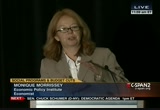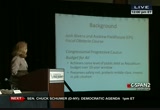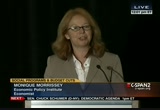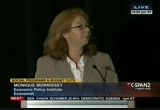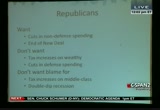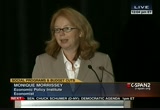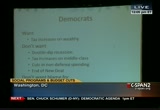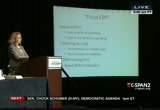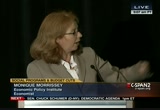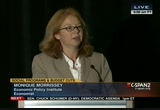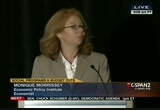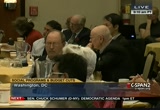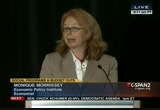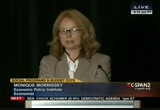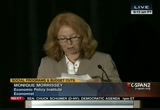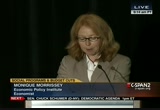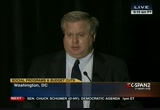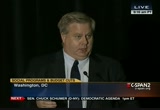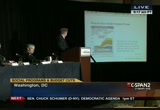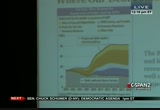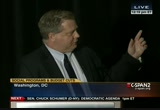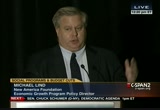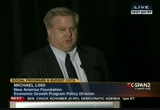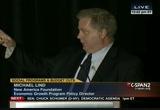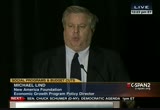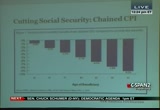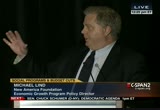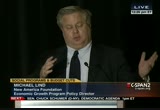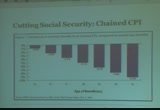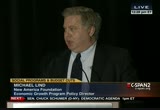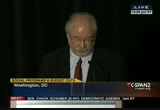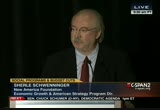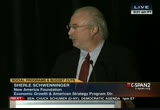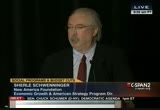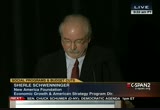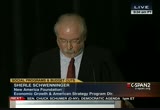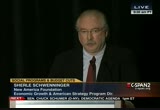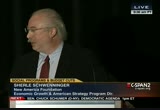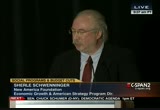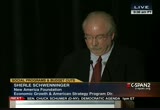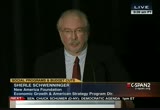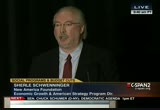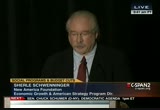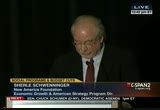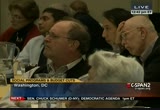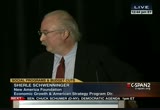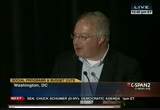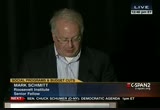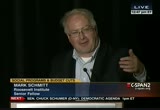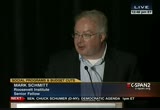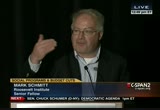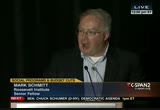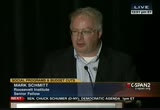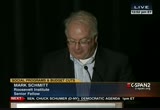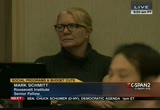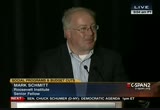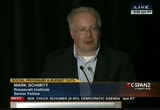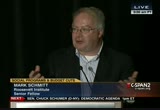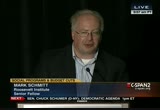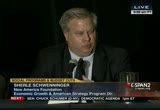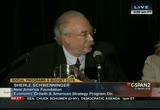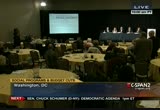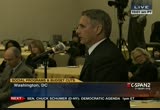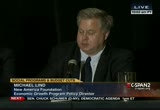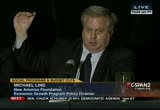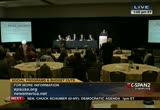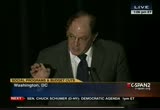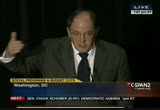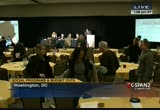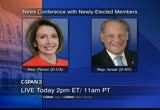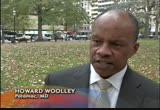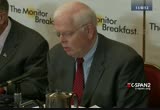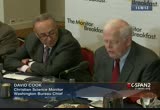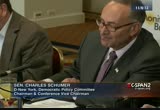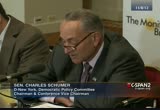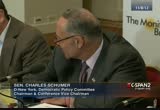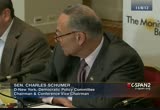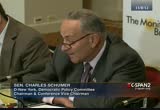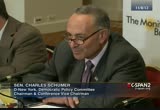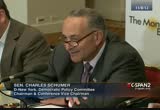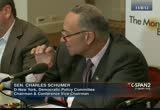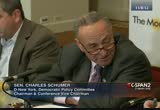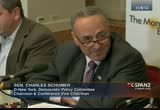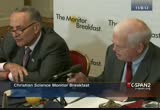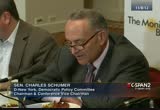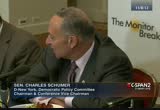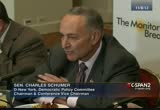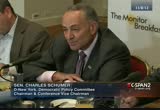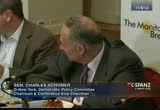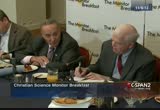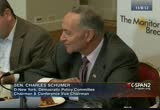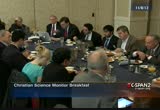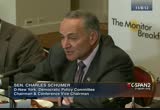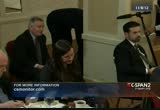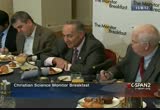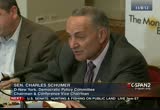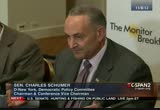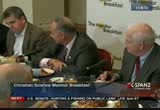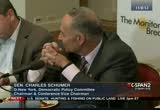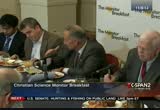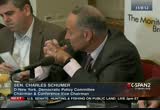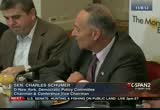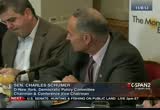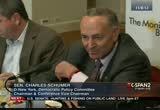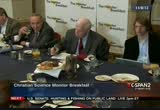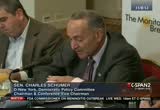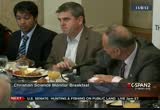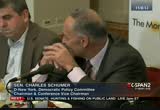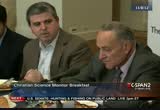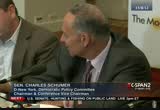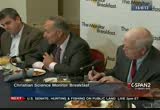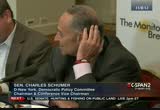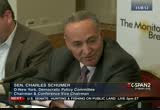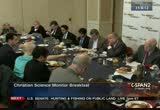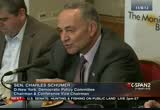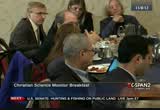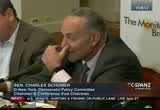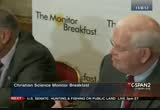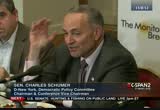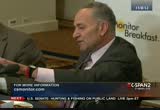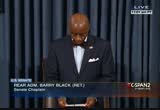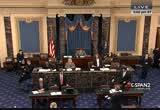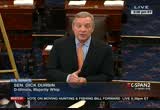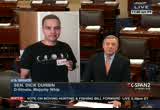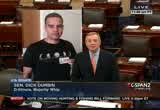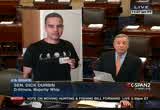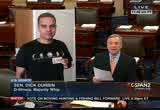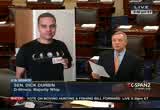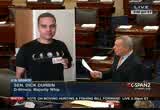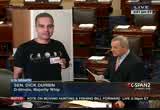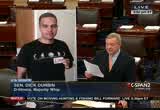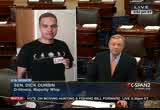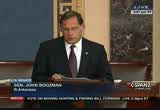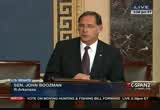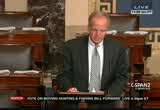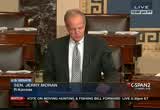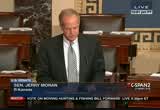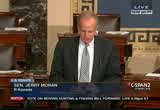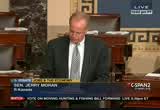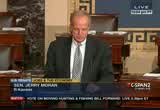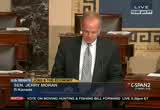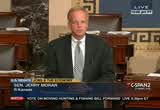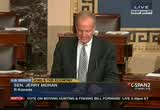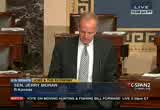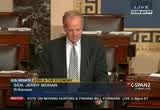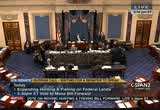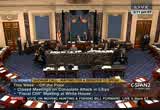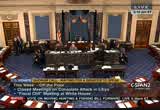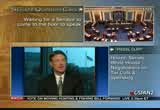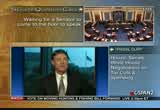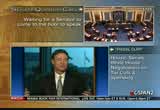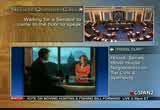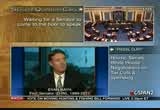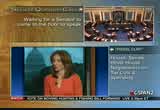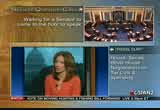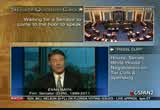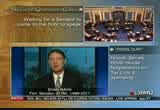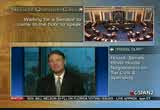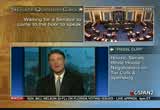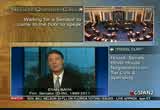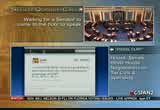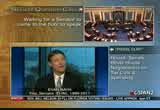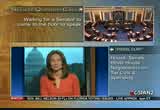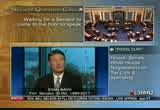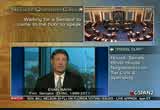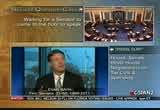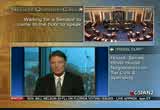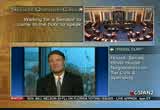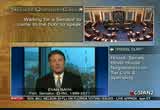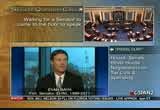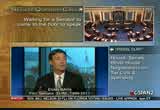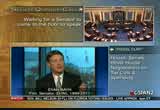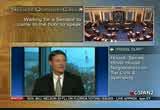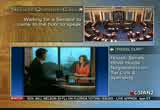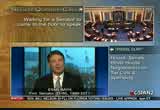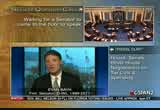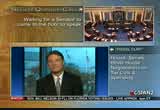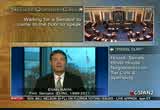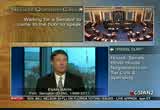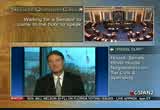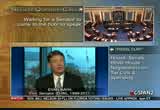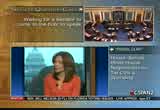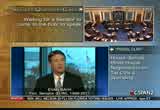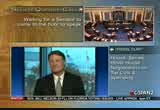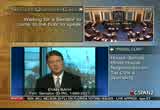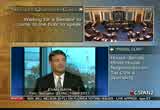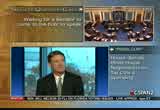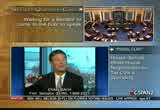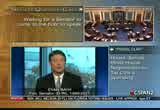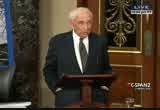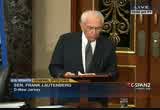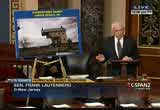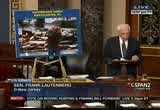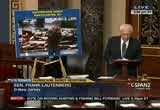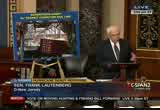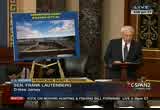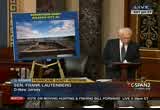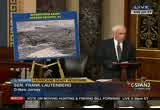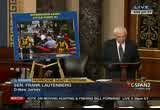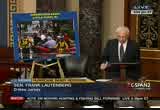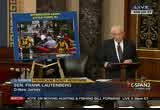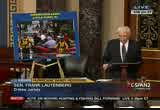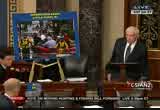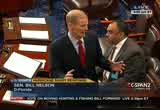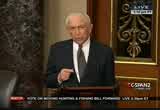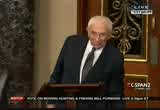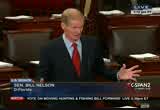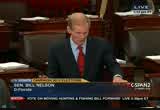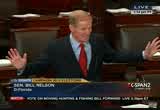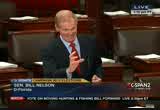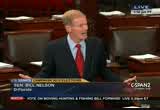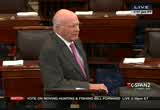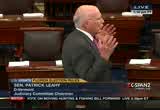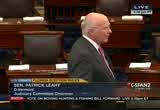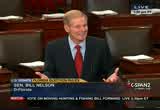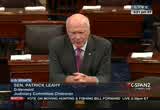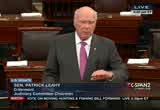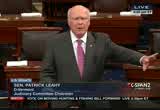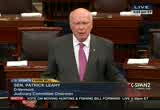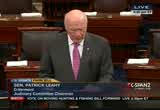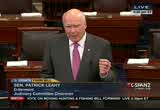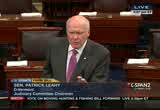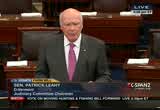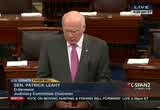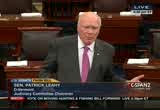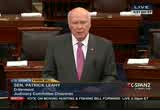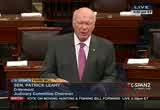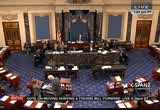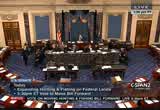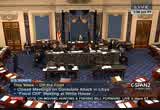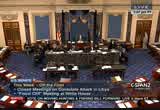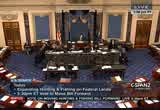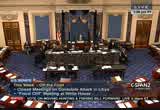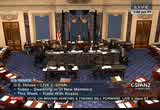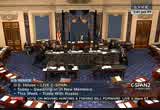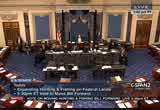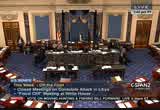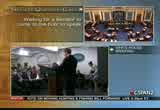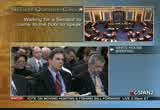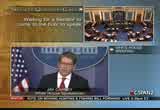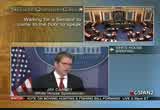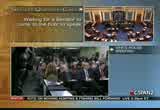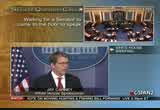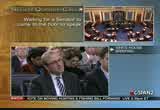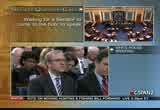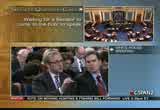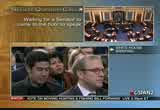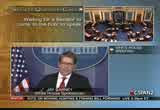tv U.S. Senate CSPAN November 13, 2012 12:00pm-5:00pm EST
12:00 pm
you can just keep shrinking so security and talking up the need for more retirement savings and publicly subsidized retirement accounts and come up with the same thing. and so i would say that in particular if there's one thing i want to accomplish today it's to commit to you guys that there is no russian social security, should not be dragged in to do one thing right, should be to make sure that social security and other programs are left out of any bargain. .. >> and it's also well written,
12:01 pm
which most economists don't write very well, so i would say that if you just want a little bit of a quick, um, you know, rundown of some of the issues and trade-offs. the other thing is the epi helped the congressional progressive caucus on the budget for all. this is an example of many kinds of things that epi works on. the point is that, you know, if you're worried -- the main point i'm going to make today is it's all politics, it's not economics, and these kinds of things demonstrating there are ways of reducing the budget long term that don't require, you know, they're not just sort of economic constraints that we've been told about with the aging population. we need to do this, we have to, you know, those trade-offs. and this is a short-term budget, i mean, medium, you know, 10-year budget window, but it shows one way of doing it. and becky thies is here, so if you are more interest inside that, she was at one point i actually tried to get her to be here instead of me because she
12:02 pm
works on social security and budget issues, so she's more of an expert on these things. so, um, okay, this is kind of obvious, but as i mentioned, i don't think -- one thing i wanted to mention is one of the issues, you know, the long-term, real challenge is projected health costs inflation. as many people point out, my theme is everything is politics, and one of the things that's political about what is considered a realistic projection or not. this has become very politicized. so, for example, the same people -- and this includes supposedly apolitical, nonpartisan actors like the congressional budge office -- will project forward unsustainable, and this was mentioned earlier, but unsustainable health costs inflation, and meanwhile when they do their more realistic projections, they will tamp down on cost containment measures. and so another, so there's sort of this bias built into these projections, and this is always
12:03 pm
something to keep in mind, you know, that the decision about what's a realistic assumption or not is very political, and it includes, um, you know, supposedly nonpartisan actors like the congressional budget office which does a lot of good work, but, um -- now, i, this was partly for my own purposes. this is an extremely simplified, you know -- i wanted and very, very cynical idea of what the republican priorities were and the democratic priorities were going into this, you know, grand bargain negotiation. and i already realize that i'm, there's an error in there, because i was just told by the last panel that the republicans aren't really that hard core. these are supposed to be priorities in terms of averting cuts in defense spending. um, and it's a cynical perspective. i say so, what republicans want is they want cuts in, you know, in government. they want to shrink government, drown it in the bathtub, famously. separately from that, they in
12:04 pm
particular want to, you know, get rid of the new deal and substitute, you know, what epi previously called, you know, the you're on your own society. so the republican vision was an ownership society where, and the democratic vision, and one way to look at it is the democrats historically have been in feign of social insurance which historically has been much more cost effective, and the republicans historically have wanted, you know, the same subsidies funneled through private means. and of late, actually, the democrats have been complicit in this, expanding the size of government in health care and other, um, areas, but doing it in a way that sort of buys off private instrument at the same time. and it's very expensive. so it's not, you know, if we really are in a belt-tightening mode, it's important to keep in mind it's not just the pentagon that has not done things very cost effectively. i'm a big fan of the recent health care reform, but it was, you know, one of its strong
12:05 pm
points was not cost containment. and in addition, the cost containment measures that were there were not viewed as credible. and so that was a political decision, and partly it was a function of how it was done. and, you know, again i'm being cynical. i say the republicans, it's not so much that -- you know, republicans are not a monolith although they're closer than democrats, but some republicans genuinely don't want to increase taxes on the middle class and don't want a double dip recession. but the way that the party, the revealed preferences of the party in recent years has been they're much more concerned about the wealthy, you know, tan they are about these things -- than they are about these things. the democrats, so we are told now, i mean, it's a bargaining position. you know, the president has gone all out saying one thing they really want out of this is tax increases, you know, to revert the bush tax cuts, essentially, on the wealthy. and, you know, as the party in
12:06 pm
power and as a responsible party, they don't want to go into another recession. and they also, you know, have also drawn a line in the sand at the 250,000. i would say that's not middle class, but that's another issue. whatever, they won't go below that. and they generally don't want to drastically shrink the size of government in general. and they go along with some things that i would consider to be, you know, leading to the end of new deal programs, but they're not -- it's not, you know, something that they would generally prefer. but that's the danger point is, you know, how many democrats are sincerely worried about the deficit and believe, genuinely believe that it is important to cut the social insurance programs to achievement achieve. so the danger, so, you know, objectively the democrats have the upper hand because if you, you know, the thing that happens automatically that, you know, is the expiration of the tax cuts
12:07 pm
and so, you know, as somebody pointed out earlier, it's sort of, part of it becomes, it's semantic. you now call -- you're now arguing about who gets tax cuts restored as opposed to talking about a tax increase, with, you know, with republicans might be something. but the tax increases would be a done deal which is an argument, again, for not trying to strike a bargain before these things take effect. the thing where the democrats are vulnerable is, again, even though it is a slope, it is going to hurt the economy. it's not going to happen overnight, we're not going to go into a major recession overnight, but, you know, the democrats clearly don't want to sacrifice unemployed workers and, you know, and the economy as a whole to, you know -- and so that's where they're vulnerable. and this is hypersimplified. i mean, i don't even -- you know, the tax increase is not just a bush tax cut, but it's a
12:08 pm
payroll tax cut, and unemployment is another big factor there, the extended unemployment. so the, you know, sort of a point -- okay. well, okay, i'm going to skip ahead, but just a couple of points to be made here. you know, economists are all glad that now -- or keynesians are glad that there's an implicit, you know, that the whole discussion around the fiscal cliff implies that you're a keynesian, that you really believe the economy's going to go south if you, if you close the deficit even though it's not usually stated in those words. you know, a couple of details are, you know, yes, generally speaking all else equal you reduce the deficit, you will have, you know, contractionary effect, but how you do it matters a lot. if you, actually, you know,
12:09 pm
famously the tax cuts on the wealthy were not very expansionary versus tax cuts in the middle class. even better than that is spending on states and infrastructure, you know, extended unemployment. these things don't cost very much, and they have a big effect on jobs. and then the other point, this is a point that my boss, the research director at epi, makes out is, you know, since a lot of democrats really do believe that long-term deficit reduction is important and there's, you know, some literature that points to, you get to the point where debt as a share of g,dp, you know, ad all of a sudden things go bad for the economy. and looking carefully at these studies, they're not really very credible. but in any case the point being even if you believe that, even if you believe at a certain point it becomes dangerous for the economy, this assumes that you've got full employment. so it's a high-class kind of problem. you can worry about that then. what we've got to worry about is years and years and years of
12:10 pm
less than full employment. and, okay, so since -- i will skip ahead to, very quickly i would just like to get to my social security. um, the thing about social security is people have been convinced, and can this is why they want a deal and they want to include social security, is i think we've reached the high point of scare mongering on social security. people are really convinced that social security and meld care together, you know, are going to bankrupt us in the future. and, you know, medicare, it's all health care. if we don't solve that problem, we've got a problem whether it's the government spending or private spending. so we've got health care cost inflation as the number one problem. the aging is really not that big of a problem. with social security we saved money in the trust fund to get us past most of the peak boomer retirement years. life expectancy growth is so moderate as a factor compared to other things that once the baby boomers retire, costs as a share of g, the p -- gdp level off.
12:11 pm
there is a little growth in life expectancy, but it's very minor. if there's a demographic problem, it's the dropoff in births, not, you know, in population growth which has to do with immigration and the birthrate and not with life expectancy. and for the record, i'm in favor of gradually increasing the payroll tax to offset increases in life expectancy because it would be so slow and so modest that it wouldn't be much of a tax increase, and it would sort of shut people up altogether. but usually, of course, it's used as an excuse for raising the retirement age which is an across the board cut and well beyond what would be necessary to offset growth in life expectancy. and, you know, i have written a lot about this issue, so i would just refer you to other stuff i've written because it is very hard to convince people it is not true. it's true, life expect tan has raisin since the -- risen since social security, people working
12:12 pm
longer already, that has tended to balance off the sort of demographic issues. and it turns out that a big reason for, that the social security shortfall has emerged actually has to do more with slow wage growth and wage inequality, so more earnings above the cap. and so -- >> one minute. >> okay. last point i make then will be -- well, i'll make two last points. one of them is that, you know, the other reason that social security and medicare tend to be hit is people look at it and tear like -- they're like, okay, 13 or 14 president of g, the p, military spending is 3%, you know, that's where -- you have to go where the money is. but what this left out here is tax expenditures and sort of not considered spending, they're a reduction in taxes. but that is where there's a lot
12:13 pm
of waste. democrats have been complicit in it. for example, why cut social security instead of cutting subsidies for 401(k)s, two-thirds of which go to the top 20% of the population? in general, that's the case for most tax expenditures, very inefficient. and today's new york times had manager about, you know, it was something that the republicans were pushing during the election, and the democrats are now easing up to it. and can there's no reason if somebody tells you that, you know, social security is the third rail, you know, why is it that the home interest deduction or the, you know, 401(k) subsidies are considered untouchable, but social security really isn't? i mean, it's because peterson has spent a lot of money, and i should own up that epi has worked with peterson on stuff, but we don't agree on this. to try to convince people that, you know, we have to touch that third rail. um, i'm just going to wrap up with just to be provocative,
12:14 pm
generally speaking this has been a love fest. i want to give bruce bartlett a bear hug. he probably wouldn't want it, although i don't think i'm contagious anymore, i've had this cold for about a week. but there are three areas that i think are important where progressives and people on this panel disagree. we did agree with cap and budget. one is, generally speaking, the importance of deficit reduction. we tend to be doveish on this. i don't think it's a problem for a long time to come, not really worried about interest rates. the other area is, you know, is part of that, one area where a lot of progressives are willing to cut social security is by reducing the cost of living adjustment. epi is behind a statement right now, we're trying to get ph.d. economists to sign, we have about 300 people who have signed on to something, you know, saying that it's a cut in benefits, and it's a particularly bad one. it goes to the most elderly beneficiaries disproportionately.
12:15 pm
but the reason that some progressives favor this is because it would also increase revenues because the same thing would happen, you know, in terms of marginal tax brackets. so this is an area of disagreement. another area is whether to extend the payroll tax cut, and within my own organization there's disagreement there. you know, we all want -- we're worried about the economy, it's one way that they do it, but i do believe that it's a republican trap to make, you know, to make it seem like to cut, you know, it could turn out to be something hard to get out of. but thank you very much. >> thank you, monique. [applause] >> what makes a bargain grand? we, according to press reports, president obama would like to have a grand bargain. the most familiar template of a
12:16 pm
grand bargain is the simpson-bowles plan written by the two co-chairs of the presidential commission on the budget whose members rejected the very plan that the co-chairs wrote. this is now being pushed by a coalition called fix the debt funded by the billionaire. pete peterson to the tune funded by a number of different corporations particularly in the financial industry but not exclusively. the basic them -- template of that and similar grand bargain deals is that in return for averting the fiscal cliff, averting what some have called more accurately the austerity bomb in the near future, congress will agree to long-term cuts in entitlements which do not include tax expenditures even though people are entitled
12:17 pm
to them, but they do include social insurance programs as monique pointed out. social insurance, medicare and medicaid. so this all the different versions of a grand bargain, long-term cuts to social security and medicare and medicaid are considered part of the deal, whatever the other details of the deal may be. and, well, why is this urgent? we are told that we need this grand bargain because we have to deal with the immediate explosion of the public debt that has occurred not just since the financial crash of 2008-2009, but also in the last decade. so if i get this right -- thanks to the center on budget and policy priorities has done this very useful chart showing where the components of the explosion of public debt in the last
12:18 pm
decade have come from. you may not be able to read it. basically, it's bush tax cuts and the unfunded wars in iraq and afghanistan which were funded exclusively by borrowing rather than by mix of borrowing and taxes as in previous wars make up an enormous chunk of it. the rest is revenue that was lost from the recession simply as individual payroll and income tax receipts and corporate income tax receipts went down. a little sliver for federal spending on the t.a.r.p., the bailouts of freddie mac and fannie mae, federal unemployment insurance and so on. so if you look at, again, from the center on budget and policy priorities, if you look at this chart or to see, well, where was the explosion in social security, medicare and medicaid spending contributing to this, you can't see it.
12:19 pm
you can't find it even with a microscope. it's not on there. social insurance has not contributed at all with the exception of automatic stabilizers during the recession. medicaid to some expent unemployment insurance to the present crisis. it's two wars, a recession and tax cuts which disproportionately benefited the rich. we are told again and again that we have to you urgently deal wih this demographic tsunami that's a tidal wave of costs which are going to escalate in the near future and bankrupt america because we can't afford spending on the elderly, on social security and medicare. well, i think if you're a oceanographer or even a mere surfer, none of these -- and this comes from "the washington post" -- none of these actually look like tidal waves. i know it's kind of small, it
12:20 pm
goes out to 2040. if you just look at the top two, health care spending, public health care spending, medicare and medicaid and social security, the second chart, if you look at social security, as monique said earlier, it goes from a little less than 5% now to about 6% by the middle of the 21st century. that's not exactly a tsunami that threatens to destroy our civilization and calls for immediate, urgent action. what it means is simply over half a century we need to either raise revenues by about 1.5% of gdp, or alternative if you want you could cut social security's benefits by that amount, or you could have some compromise. or you could think about reform within the context of the retirement system as a whole, and arguably as i would suggest
12:21 pm
expand social security which is the most stable part at the expense of reductions in the volatile and unstable part of our retirement system which is tax-favored 401(k)s which have done a terrible job compared to social security. these are all debates worth having. we have decades to have them. it's true by the 2030s when the trust fund is exhausted, there will be a drop. and congress, presumably some years in advance, will have to deal with it. do we have to deal with the social security, its long-term financial outlook in the lame duck session in the next couple of weeks before the holidays or even by july 4th which some of these deficit reduction efforts have set as their deadline? evidently not. there's more of a problem from a fiscal point of view with the rise in medicare and medicaid costs. but even this here we have it going up to 10% by about the
12:22 pm
year 2040, 10% of gdp from under 5% a day. that's not insignificant, that's a significant amount of gdp. do we really, are we confident that we know what share of gdp will go to health care whether it's channeled through public programs like medicare and medicaid or the private sector in the year 2040 a.d.? i think not. in fact, this chart since it ends at 2040 really does not serve the purposes of scaring people. because saying it goes from a little less than 5 to about 10 in 40 years is not terribly frightening and apocalyptic. and for that reason the scare mongers and the doomsayers about medicare and medicaid typically use a chart that goes out to the 2080s. whereas james galbraith said in the panel earlier this morning that way you can have these costs extrapolated up to 40%
12:23 pm
which is scarier than 10% in 40 years, 40% in 80 years, you know? conceivably, i don't know if anyone's done the experiment, maybe you could project it out to the year 2200 a.d. and show that it would be 200% of gdp, right? [laughter] the point is, are these projections -- well, yes, we will have to act at some point, or unless new technology or delivery system reform or something solves the problem, which is quite conceivable, is it really urgent that we try to settle this problem to the extent that it's a problem between now and the holidays or in the spring of 2013? again, i think the rational person would ask, you know, this is kind of like saying, well, you know, your parents had cancer when they were 60, so at the age of 20 you should go ahead and have an operation just in case, right? just to make sure. it might develop in 30 or 40 years. well, then why is it -- and this
12:24 pm
is, ultimately, a political question. it's not an economic question. why is anyone talking about fixing social security and medicare in the next six months? or the next, for that matter, five or six weeks? as part of a grand bargain? why are you even discussing this? and even if there were a few irrational people saying things, why would anyone take it seriously? i think this shows the answer. this is one of the ways that you can cut social security benefits that have been discussed as a possible part of the grand bargain. monique mentioned another one, raising eligibility ages. this is using a chain cpi, a consumer price index. it's an alternate measure of inflation. i'm not an economy me tradition.
12:25 pm
the point is this actually appeals to individuals and organizations who want long-term social security cuts because it gets the results they want. it essentially does it over time. it's cumulative, and it gets worse and worse as you get older. so when you're 65, it's less than 3%. if you -- less than 1%. if you lev to be 95, it's a nearly 10% cut in your benefits compared to today. so, you know, i'm not going to debate the merits of this. you know, you can make the case in favor of it. i'm just going to make a political point. if you had a separate national conversation on what to do about social security over three or four years and there was no rush
12:26 pm
and there was no deadline and there was no sense of urgency and you had commissions, and they came up with proposals, and then there was legislation in congress, i think it would be a lot more difficult to sell this to the public. right? to say that, you know, we're not going to talk about any other aspects of the budget, all we're going to talk about is social security, and our plan is to cut social security benefits through stealth inflation tax by 10% for 95-year-olds, vote for us. right? i don't think that would be very popular. and the same is true of a lot of other medicare reforms which involve not reducing the price of medical goods and services in the u.s. which are overpriced by oecd standards, not improving delivery system efficiency, but just rationing assets. if you had a separate, free-standing national conversation with no deadline, no sense of urgency what to do
12:27 pm
about the future of medicare and medicaid, and one group just said we want massive, permanent rationing of access to health care, again, that's not going to go anywhere. so if you favor cutting entitlements like social security and medicare and medicaid by methods like this, it makes perfect sense. you want to bury this in the fine print of legislation on another subject like averting the fiscal cliff. it's like putting a writer on something that has nothing to do with the defense department. that is i think the groups in the united states which for ideological reasons in the case of some parts of the financial industry for pecuniary or reasons want to cut social insurance and force people to buy more private, for-profit sector products like annuities
12:28 pm
or private health insurance. they know they can't win this argument if grand bargain is unbund med -- unbundled, if these are separate debates. their best chance is to, first of all, create a completely artificial sense of urgency. we have to do all of this now. the clock is ticking, you know? by december 31st or by july 3rd, 2013. and second, to bury this, right, to bury the cuts in like some grand, comprehensive package which will include tax increases, avert the alternate minimum tax, avert the sequestration and all of that, it is a -- i actually think it's a brilliant political strategy. it's probably the only political strategy that can achieve what they want. because unless they ram this through in a hurry, if you have a pinny deal instead of -- a
12:29 pm
mini deal instead of a grand bargain which sets aside the long-term entitlement reform and focuses only on the immediate obstacle course of various issues, we will revisit all of these things, social security, medicare, medicaid for generations to come. but you won't have that sense of urgency, and you won't have the ability to ram through a lot of ill-considered, ill-debated questions in the middle of the night right before a deadline. thank you. [applause] [inaudible conversations] >> it's always a challenge to follow my esteemed colleague, michael lind, who serves as policy director for our economic growth program and has headed
12:30 pm
up, also, our next social contract initiative over the last couple years. i want to come back to the question that basil posed to the first panel, and in doing so i want to talk about what i believe is the, actually, most fundamental flaw in the grand bargain as represented by simpson-bowles. now, if you remember basil's question is whether there is not a trade-off between public investment -- particularly growth-enhancement -- infrastructure, education, research and development. and meeting our social security and medicare obligations. ..
12:31 pm
12:32 pm
not be appropriate. now what is that essential model of economic growth? in essence they're calling for lowering the tax rates as if tax rates and this supply side magic is the key to economic growth. yes they're broadening the base by cutting certain tax expenditures trying to create efficiency but the overall thrust of their, their message is to keep tax rates low, keep public spending low to prevent public spending from crowding out private investment as if capital is scarce in the world. but this is not the economic conditions that we face now or that we will face over the next five to eight years. beyond eight years i won't venture to extrapolate
12:33 pm
because as james galbraith pointed out, some of these trend become discontinueous after a certain point. but what i do want to, do want to stress here is that this model of economic growth, a mild version of the supply side economic philosophy that has guided economic policy for much of the last decade or two is fundamentally ill-suited for the economic conditions that we will face over the next five to eight years. and indeed these economic conditions i would argue, call for greater sustained public spending, both increased spending on growth enhancing public investment, and, increased spending on social security and public funded health care.
12:34 pm
i want to touch on the six trends that i believe will define our economic conditions over the next five to eight years and then explain why in effect i've come to the conclusion that we need both increased public investment and increased spending on social support programs and new deal programs in order to have robust or sufficiently robust economic growth. the first trend is the obvious one that we're still in the early stages of a global deleveraging process. in the u.s. the best measures suggest that we may be nearly halfway there in household deleveraging, but europe has just begun. china has not even begun to confront its deleveraging problem. it will have after the buildup of the non-performing loans which will become more apparent as
12:35 pm
we go on. the consequences of this in the u.s. of which we face another three to five to eight years of private sector household deleveraging but also face a worldwide problem of weak external demand that we will, we will have a process of paying down debt that destroys demand in the private sector, also weakening private investment. therefore otherwise we would expect weak skmik growth -- economic growth. second we have two demographic trends that are intersecting. we hear a lot about the aging problem but in fact the interim five to eight period, year period, we have two demographic trends that are going to exacerbate the supply demand equation and the imbalance in the global economy and increase the relative weight of savings versus, versus demand for
12:36 pm
investment. first, we have the emerging economies, many of which are already high saving and producer-oriented economies will enter their peak savings and production period. yes, consumption will increase in those societies but if those patterns follow other demographics the actual proportion of savings will actually increase in many of those societies. the goldman sachs study on this two or three years ago i believe is impeccable and everyone should read it. this will occur at the same time that we're having a period of private savings catch-up in most of the advanced industrialized countries. most of the baby boomers have five to 10 years left of earning capacity. most of them have undersaved. many of them are going to be saving more to catch up and
12:37 pm
because of many of them face problems created by repeated market set backs. so you're going to have abundant capital and in particular you're going to have a shortage of fixed income investments which are going to complicate the retirement income planning, planning process. that means that you will have an enormous demand for u.s. treasury debt yet in the world partly because you will have problems in other parts of the world. the third trend is that you're going to have the ongoing mechanization of auto manufacturing and business services not just in the u.s. but globally as well. and what this is going to do is reduce the demand for labor and the available middle income jobs.
12:38 pm
at some point in the u.s. we will reach certain limits about automation and even we'll maybe face some slowdown in productivity growth. we still have a long ways to go in terms of the fact that machines are still replacing labor in many parts of our economy. therefore labor will be abundant, employment and jobs will be very constrained, and we will continue to face distributetive challenges of pressures of technological change giving rise to rising inequality or continued inequality. the fourth trend is that absent a more complete breakdown of globalization, we're going to have continued intense global competition in the traded sectors of both the advanced
12:39 pm
and newly emerged economies which will result or place limits on companies specific research and development and infrastructure investment. that means more of the burden for r&d and infrastructure investment actually will fall to government and the public sector in the future. simultaneously we're going to have continued financial constraints at the state level in the united states, which means that, that the federal government will have to compensate for cutbacks at the state level in education and other, other necessary investments as well as support for social programs. finally, and this one is slightly more optimistic but continuing with the theme of abundance, we will see the development of an energy
12:40 pm
surplus because of technological advances in exploiting both oil and natural gas resources, combined with new energy efficiency measures that will greatly reduce u.s. energy use. now the u.s. is now predicted, the international energy agency, predicts the u.s. will be the, will be the number one producer of oil by 2020. it will also be probably close to the top in the producers of natural gas. this will give us the wealth and income, mike lindh mentioned -- lind, mentioned 1 1/2% of gdp, we have 16 to 20 years to make up for the short fall in, in social security and 4 to 5% in medicare. well, the explosion of a
12:41 pm
moving from a energy deficit to a energy surplus will more than half close that gdp gap. so, we have a economic conditions that suggest that the challenges we face are the exact opposite of what the bowles-simpson grand bargain would impose on us as a growth strategy. the conditions that we're going to face over the next five to eight years with some amelioration if we do the right things are an ongoing shortfall of both domestic and global demand, excess capital and labor and excess capacity in major, many major industries. overcapacity in many sectors of the world economy, a
12:42 pm
disattributetive inequality challenges caused by ongoing automation. in those circumstances i would argue we need both more public investment but we also need stronger social security and public health care programs to eases -- ease the distributetive challenges but also to insure adequate demand and employment in the economy. so more public investment is needed to create jobs to fill the demand hole and to insure adequate infrastructure and research and development and training but stronger social support programs are also necessary in a demand and employment constrained world in order to fill, help further fill the demand hole, create jobs, and help correct the inequality and distributed
12:43 pm
justice challenge. in other words, we need a growth strategy that is built on public investment-led growth that will in fact help crowd in private investment and fill the demand gap that we face both dough mess he canly and globally. let me make one final point that goes to the politics. having said and laid out the economic case for an economic growth strategy that is very different than that with be imposed by simpsons and bowles, i do understand that the problem of political constraints. the political constraints on public spending, the inability to grasp the meaning of stephanie's very important contribution and
12:44 pm
jamie's comments earlier today. so in effect we need mechanisms that will allow us to expand the budget, budget multipliers, if you will and the principle budget multipliers would result from the revival of what my colleague mike lind cause public purpose finance in the u.s. jamie says the public finance is many respects is still broken and at the same time we have suffocated our public purpose finance mechanisms. the credit of the federal credit programs and guaranty programs that are needed to leverage private capital without putting it on the public balance sheet. so i think the one of the most important ideas is to support the idea that bernard schwartz has long supported which is actually the establishment of the public bank for infrastructure and development, which would
12:45 pm
allow you to leverage private capital and greatly increase public/private infrastructure investment at a time where private companies don't want to undertake it. but to do it in a way that doesn't add immediately to the public debt. only adds to the public debt to the extent that the risk of these projects not failing to return. so on that point i will conclude. [applause] >> thank you very much. grad to be here and appreciate being part of this i'm always in awe of sherl's ability to put the issues in the broadest global context and really help us think differently about it. i want to, i think i'm going to start by narrowing it down a little bit and bringing us back to some of the more mundane politics here. one thing that doesn't come
12:46 pm
up enough in discussions of the fiscal cliff is actually reminder of why there is a fiscal cliff. why are all these things, you know, hitting at once? part of the them as we know are the some of the temporary stimulus measures in the early obama administration and also in 2011 that were temporary tax cuts that were designed to give the economy a boost by their nature that are temporary and should be revisited. we may conclude the economy still needs that boost and that is totally appropriate. some of it is the alternative minimum tax that is basically always broken and always needs some changes to it. the sequesters on domestic and defense spending are products of the blackmail episode of 2011 when congressional leaders refused to enter, refused to do as is routinely done and extend the debt limit and created this sequester as a way to force some action they had no intention of doing themselves.
12:47 pm
but the biggest part of it comes from the bush tax cuts and the reason the bush tax cuts expire is an interesting story. in 2001 and 2003, 2001 we had a budget surplus and both democrats and republicans wanted to cut taxes. democrats wanted to cut them half as much and put more emphasis on the middle class, less on tax cuts for the rich. republicans did not only want, they wanted what we have and wanted to be in the position where they had to compromise with emdid he kratz at all under any circumstances even though, reasonable compromise would have certainly passed. in fact their own bill might have passed but they didn't want to risk that. so they used the procedure known as budget reconciliation with tax cuts voted for 50 votes in the senate without having any compromise the problem only way you can use the process of budget reconciliation you can't do anything that
12:48 pm
increases deficit what is called in the out years, the years beyond the 10-year budget window. they didn't want them to expire but made them expire in order to use that process. you have something that begins as, deeply aggressive political maneuver that has now turned into as jamie said in the opening and others said here, has now turned into a kind of a different kind of tool. one that's designed to force action on some budget decisions that, as mike said would not be the actions we would take otherwise so that by creating the fiscal cliff we're now under the gun in a place where if decisions that are likely to be made, in a sense, we're using tax and other things as leverage to, on social security and medicare, in particular, to force, to force some changes that we might not make otherwise, such as raising eligibility ages, implementing the cpi or other ideas that are kind of what you do if you're, if you have to throw something together in the middle of the night in order to avoid
12:49 pm
yet another blackmail episode. so it's really, i think it is important to recognize that when you think about the fiscal cliff. it is not a natural phenomenon. it is something that was created by a series of decisions which, you know, many of which should really shouldn't have happened. and then, once we have the other side of the fiscal cliff, not only do we have room to think about these issues in different way, there are pretty good things that fall into place on the other side of the fiscal cliff. for example, people were talking in the campaign, you heard both romney and at different times obama has talked about some kind of overall cap on deductions in, on the deductions that an individual can take. guess what? we had something roughly similar to that mostly for high end earners. those two provisions have been out of that effect since the bush tax cuts. they would come back into effect on the other side of the fiscal cliff. not a bad thing. capital-gains tax rate goes up from 15% where
12:50 pm
encouraging all the maneuvers that you see if you looked at the romney tax returns for example, all the carried interest loophole, hedge fund loophole, all are products of the fact that we have such a low capital gains rate and incentive to define capital gains are so high, capital gains rate goes up at 20%. should be same level as other income but that is progress. dividend rate goes up to the level of normal income. those are good things on the other side of the fiscal cliff. obviously there are things that you would want to change. you want to restore some of the child tax credit and refundable child tax credit and the middle class tax cuts and so forth but there is a lot of good on the other side of the fiscal cliff. there is also an opportunity there i think to think and talk about medicare and social security in the way that michael was suggest, with a little more rationality to it. i am often worried that we do treat these programs as, you know, sacred and untouchable, and i don't
12:51 pm
think that is really appropriate either. there was lesson that was overlearned in, in 2005, progressives did a very smart thing when president bush proposed privatization of social security. they basically said, you know what? we can't play this game. we all have other interesting ideas about how to improve social security. we have the pure diamond peter orszag plan, a whole bunch of other things, they're all good. we're not entering this game. we're not playing on social security because we will lose if we do. that was very smart for 2005 but i think as we, as we go into a different era, different political configuration, i think we can have a little more, more of the occur ran to say, social security has changed. basically it has been changed every other year since it was created. it was changed about six times by franklin roosevelt. it was changed many ways to adjust women entering it -- changed the to bias against african-american workers.
12:52 pm
changed to reflect the greater role of women in the workplace and so forth. it has been changed dramatically. we should be unafraid to be willing to change and improve these programs, not just to cut their costs but to say, what are they doing well and how do we really achieve these, how do we better achieve the goals of social security and medicare? last week i read after the election david brooks wrote a column which had the classic, you know, you agree with some of it and some of it is absolutely infuriating. his quote at the end he basically said look to the republican party, your attempt to dei can it -- depict the country half the people dependent on government, half not, it didn't didn't resonate with people. most people, they understand that the government can be helpful to them as well. he concluded by saying to republicans don't get hung up whether the federal government is 20 or 22% of gdp, let the democrats be the party of security,
12:53 pm
defending the 20th century welfare state. you be the party that celebrates works and inflames enterprise. that is classic portrayal, what we're defending here is crusty old programs, all they do is provide security so that you know, they don't have anything to do with lifting people up in the workplace. nothing could be further than the truth. we need to get out there and really establish the point that, you know, real economic opportunity comes from having security. it comes from having the security of you know that your health care isn't dependent on your job so you can take advantage of other opportunities. knowing at least a portion of your retirement savings is secure. if it was all up to you would have to put some of it in the securest form of t-bills, something like that so that base is really important to your ability to take other economic risks and take chances and i think we really need to, to establish that. and, on medicare, obviously i think it is, regardless of
12:54 pm
how, of where we see the budget deficit, i think, a path that put ps us to medicare taking, you know, spending 5.7% of gdp in 2035 as projected, and i'm, as skeptical of anybody how projections work. we don't want to get to that point. that is not a good use of our national, that is not a good statement of our priorities but there are ways to get there by properly implementing the affordable care act. it begins to show which of the kind of cost savings that actually do work and don't work and which can be, can be blended into, to medicare and also into, into medicaid to begin to reduce those costs. it would certainly be, i saw the other day christina romer said, raising the eligibility age for medicare could be okay because the affordable care act will cover people up to that age which is, my feeling is, that might be but we are
12:55 pm
nowhere near being able to say for sure that that's going to work in a way that will support people in that age. i think we really want to think about, in basically saying how can we make the programs to work better to allow people to take full advantage of their own, of their own aspirations and really live a better life. we really want to look closely what's happening, what are we doing for people in that age range of say 58, 62, up to 65? jamie galbraith when i was at "the american prospect", we published a great piece by him suggesting that with the pressures on, difficulty for young people finding employment, maybe we should just actually make it much easier for people to, to step, all or partially out of the workforce at age 62 without the penalty that kicks in order to encourage that. i think that is one interesting idea. we're certainly seeing a lot of people in that age range,
12:56 pm
that's where, a lot of the long-term unemployment is concentrated. you see, you know, 2/3 of people are already taking social security benefits at age 62. there are points where that is economically rationale or not. i'm guessing a large portion of those people are not making a rational economic decision how to do that. just they're in the situation at 62 they need the cash. that is the population we need to think about. what is the way to ease that transition from, you know, the later years of working life towards retirement and possibly some other savings vehicles might be part of that answer within, within social security? and also i think we ought to be willing, there is an interesting part of the never touch social security reaction, sometimes from progressives, is there is reluck tans to really embrace increases in the payroll tax at the high end. i certainly held that view at times because, it creates something we think that social security only works because, you know, basically
12:57 pm
it's a good deal for everybody. it's not, it has a certain amount of progressivety in it but not so much that anybody is really worse off. it's not, it's not a massively redistributive program. the more you raise the payroll tax of course the more it become as redistributive program if you're not changing benefits in the same way, if you're raising the ceiling on the payroll tax. you create a population of well off people for whom that is social security payment become as little more of a bad deal depending how high you go. i've always been wary of that. i think in keeping with the principle let's be unafraid of making changes, we should be less worried about it. i think the public is less unwilling, the public has more recognition we do support, we do have programs that redistribute that is poor people who have less, that, others pay more. you see it in the public support for programs like the state child children's
12:58 pm
health insurance program. i think there is willingness to accept that. i don't think we have to cling to the funding model of social security exactly as it is and should be willing to onter taken some of those payroll tax increases. all of that is on the other side of the fiscal cliff. thank you. >> the form mat, if people have questions they can go to the mooirgs. i want to -- mics. start off, there are three is choices but a yes just to run down the panel. in terms of the of the fiscal cliff, big deal, small deal, go off the cliff? what is your preference? >> i would say small deal. i understand the logic if you go off the cliff the third week of january you can then claw back, make, tax cuts and all that. i do think you have to worry
12:59 pm
about business confidence and markets and that sort of thing. maybe that is exaggerated. i would go for a small deal. >> mark? >> off the cliff. >> off the cliff. >> off the cliff. >> what was the first choice? >> big, small, cliff. >> i actually think it is a bigger deal than maybe the consensus here because i'm thinking about a lot of the people i know who are barely making ends meet and they're going to be shocked come january 15th when they get their next paycheck, and they're going to see 50 to $100 less. that would mean the difference between making a rent, paying telephone bill, or not. and that is going to have a much bigger, you know, there's a business of certainty but there's also the consumer uncertainty for large numbers of people that are going to be, dramaticly impacted by even a fairly
1:00 pm
small increase in the payroll tax and some increase in the withholding. i'm saying this also to at a time where at least my reading of the economy while we saw a few encouraging signs we've seen a lot of peaking of economic activity in the july through september period and a lot of, a lot of trends that are now turning downward. so the economy is also vulnerable. so i think it is a bigger deal than, that we shouldn't be rushed into making a bad grand bargain. that's clear. but, we should be concerned in my view about falling off the cliff . .
1:01 pm
>> did not include any budget impact or for that, even chuck grassley, senator grassley who play add major role in passing that law, said later when he was asked why didn't we pay for it, he said at the time it was dumb not to pay for things. one of the single most outrageous statements in the last ten years. that was a really big deal, and it wasn't paid for. i also was working a lot on legislative transparency at the time. it was one to have least-read and most -- one of the least-read and most ill put together bills that the congress has ever passed, or at least in the last 40 years or something. and i think it's worth, you know, even if you believe every
1:02 pm
dime the medicare part d plan p spends is great, my mother benefited and everything, i think we should at least acknowledge it was not paid for, and it's not the way we want to do these kind of programs. i just think as a point of fact it was a big deal, and it ought to be counted, and i think that cbpp chart is misleading and wrong. >> okay, i can't -- i've looked at the cbp chart, though not recently. i know we at c. a.p. did a similar chart, and it certainly included that increase in spending. it didn't get its own section, but it was in the increased spending under president bush category. >> [inaudible] >> thinks it will explode, you know, more than, you know, like the other programs. >> yeah. >> in general. but even if that's the case, our whole conversation is about how do we pay -- and for this case
1:03 pm
drugs, right? not about how much do they cost. and this is what we actually have to have a national conversation about. medical goods and services in general in the united states, physician fees, hospital stays, pharmaceuticals cost much more than they do in every other oecd country including canada. that's not universeally the case, but that's generally the case. why is that? there's a consensus in the scholarly literature that no one in public life, democrat or republican, you know, talking head on tv can ever mention, which is that every other industrial country has price controls, basically. it regulates the prices of medical goods and services by means of something called all-payer regulation. the government negotiates with representatives of the hospitals and the physicians every couple years, every two or three years. they set rates. an aspirin costs this much, and
1:04 pm
that's what it is in canada, germany or japan until there's the new round of negotiations. i've gone for years to discussions in washington about health care cost reform, and it comes up with more general practitioners, you know, this delivery reform, that delivery reform. that's not actually the way it's done. now, not to say that those can't contribute. but until we're willing to do what the rest of the industrial world does, and that's to have essentially utility-style rate regulation of the medical industry treating it as a utility where the government does set prices, what we have is this hybrid system where medicare does this, it has it own fees, but the private sector jacks up their own prices in order to determine what the pharma company profit should be. unless we have that conversation, the entire conversation is going to be about rationing access to overpriced medical goods and services in america rather than
1:05 pm
lowering prices without rationing access. >> so i apologize, i'm getting the high sign that it's time to wrap up. those with questions, you might be able to grab people on the way out. so thank you and thank the panelists. [applause] [inaudible conversations] [inaudible conversations] >> two days ago jackie townes gave us an example of the tone writing that beyond the specifics of any accord perhaps the bigger question hanging over
1:06 pm
the negotiations to come is whether mr. obama will go to his second inaugural in january with an achievement that starts to write -- rewrite the unflattering leadership narrative that fairly or not came to define his first term for many people. that was a comment written as though it were news in a news story, and i had to say, i beg your pardon? the president has just been reelected by a resounding vote. only the second democrat since roosevelt. we all know why, on what broad principles and values the election was fought. e has nothing left to prove -- he has nothing left to prove politically. this is not a head game, and one can be fairly confident he knows that. it's about doing the right thing, taking the time,
1:07 pm
redefines the discourse -- redefining the discourse and setting a new course of action. we at eps, economists for peace and security, hope that this symposium has made a useful contribution to that process. bringing some clarity to these highly-charged and in some cases deliberately confusing questions. i think it has made that contribution, and that is thanks to the exceptional crispness and clarity of the participants on our three panels. i want to thank them. i want to thank the moderators; michael, richard and stan, for doing a terrific job of keeping us on course. i would like to thank you in the audience for attending, for your
1:08 pm
questions, for your participation. i'd like to thank josh friedman of the new america foundation for his help and assistance with the program and with important parts of the logistics. i need to thank ellie warren in the back here, eps, and our director, tea harvey, who always does an impeccable job with these symposia. [applause] and finally, once again, i would like to thank bernard schwartz for his support and friendship and help with everything that we do over the years. thank you very much. thank you all, and we are adjourned. [applause]
1:09 pm
[inaudible conversations] >> as this forum comes to a close, if you missed any of this discussion, you can see it in our c span video library. go to c-span.org. well, the u.s. senate returns today to begin its lame duck session. they gavel in at 2 eastern to start debate on a bill expanding hunting and fishing on federal lands. actually, they'll continue debate on that bill. a vote to move the measure forward is scheduled for 5:30 eastern. and off the floor this week, senators hold closed-door meetings on the attack in benghazi, libya, and also with president obama at the white house. the house also meets today. they'll swear in new members for the current congress who ran in special elections and later this week trade with russia and mull doe v.a. the house has a public hearing later this week on the libya attack, and house republican leaders will also be going to the white house on friday. house democratic leader nancy
1:10 pm
pelosi joins steve israel to introduce a new house democrat, new house democrats who were elected this month. these members will take office in january, and c-span is scheduled to cover this briefing live at 2 eastern right after the house gavels out. >> c-span invites middle and high school students to send a message to the president through a short video. let president obama know what's the most important issue he should consider in 2013 for a chance to win the grand prize of $5,000. c-span's student cam video competition is open to students grades 6-12, and the deadline is january 18, 2013. go online to studentcam.org. >> what i like about c pan's coverage is -- c-span's coverage is it's in depth. often times you'll cover an event from start to finish, and i can get the information that i need. i like to watch "the communicators," i like to watch congressional hearings.
1:11 pm
the events that you do at the national press club where there are policy leaders speaking, i find those useful. >> howard woolley watches c-span on verizon. c-span, created by america's cable companies in 1979, brought to you as a public service by your television provider. [inaudible conversations] >> new york senator chuck schumer spoke last week about what's called the fiscal cliff and other issues facing congress. this is about aen hour. >> thank you for coming. our guest today is senate charles schumer, vice chair of the democratic conference and chair of the senate democratic policy and communications center. his last visit with the group was way too long ago, back in november 2006, when he had just led the democratic senatorial
1:12 pm
campaign to the first of two successful efforts to boost senate democratic population. senator smiler was born in brooklyn, graduated first in his class at james madison high school which as trivia buffs and read, of the "almanac of american politics" is also the alma mater of associate justice i'd bader -- ruth ruth bader ginsburg. at age 23 he won a seat on the new york assembly, the youngest person to do that since teddy roosevelt. he was elected to the u.s. house just before he turned 30, and in 1998 he was elected to the senate where he's twice won re-election by very comfortable margins. thus endth the biographical organization of the program. as always, we're on the record here. please, no live blogging or tweeting or other means of filing while the breakfast is underway. there's no embargo when the session ends, except that c-span as agreed not to post the video on its web site until noon today
1:13 pm
to give those of you what paid for the breakfast time to file. if you'd like to ask a question, please, do the traditional thing and send me a subtle, nonthreatening signal, and we'll start by offering our guest the opportunity to make some opening comments, then we'll move to questions from around the senator. >> thank you, dave, and thanks for the nice introduction. the part i'm proudest of was padson high school which not only had ruth bader ginsburg, we have four nobel laureates, and at one point we had three u.s. senators, each of a different party. i think that probably is a historic first. there was myself for the democrats, bernie sanders, independent, and norm coleman of the republican party. when i went to minnesota to work for amy klobuchar in fall of 2006, i said there were three madison high school graduates in the senate, i hoped to make it two two years from now, and that is what happened. [laughter] so now there are two. so let me just make a couple
1:14 pm
of -- let me start off with four brief points. first, the thrust of the election. basically, i think the voters sent us a message to work together and solve bipartisan issues. and they sent a signal as to what bipartisan compromise should look like in terms of our fiscal cliff. first, in terms of sending the signal to work together, you have an election where the house basically stayed the same as it was, um, and you had a, you had the president win a decisive, overwhelming victory in the senate. we actually picked up seats. and so that is, obviously, saying work together, meet halfway, come together. neither side totally ran the table and got every part of the, you know, either house, senate and presidency.
1:15 pm
second, i think on the fiscal cliff it also sent us a message that you can sort of discern, um, without too much difficulty. they said when they sent the -- what does the house republican party stand for above all? it's, you know, cut government spending. it's reduce government spending, and the house was reelected. but on the senate -- but on the democratic side, they sent a message that part of the fiscal compromise should be revenues. the president campaigned up til the last day, one of his major planks of his platform was revenues, raise taxes or don't let taxes go town on the wealthy -- go down on the wealthy. and most of our senate candidates campaigned on that as well. um, in the debate mitt romney actually shied away from the republican position of not to do it, as you saw particularly in the second and third debates.
1:16 pm
so i think it's pretty clear that they said, hey, come to a compromise, get a handle on spending but raise some revenues, particularly on the wealthiest people. many republicans were hoping, you know, they said this election will be a referendum on revenues, and once we win everything, we won't have to raise revenues and, obviously, that didn't happen. and so i hope that our republican colleagues take that to heed. two years ago, 2010, there was a clear message -- cut spending. and we were shellacked in the elections. and we took that message to heart. we cut $900 billion out of spending, mainly domestic discretionary spending. most democrats didn't like it, but that was the electoral message. well, again, we hope our colleagues take that to heart. if you want -- there's not too much dispute about the tax side. the president, as i said, campaigned on it. 50% of those in the exit polls
1:17 pm
said that they were for tax, raising taxes on or tax rates on the -- taxes on the top earners should go up to fix the deficit. i was heartened, very heartened by the tone that speaker -- it's my second point -- that speaker boehner showed yesterday in his remarks. he basically said that the president won the election, and he should lead. he basically, he said that he was open to revenues. which is, which many in his own party disagree with. um, so i thought the tone was the right thing. now, you know, you can't expect the speaker to turn on a dime in 24 hours and embrace everything; higher taxes, higher taxes on the wealthy. but i think that privately he's seen the handwriting on the wall, and it makes me very
1:18 pm
hopeful that we can do something big in the next month and a half. it's a good first step. um, i would say two things, though, in relation to it. when you unpack the speaker's speech, there is a premise that doesn't quite work, and we're going to have to help him move others in the republican party away from it. it's called -- part of his speech he talked about dynamic scoring. this idea that if you cut taxes, you will increase revenues. well, it's about time we debunked that myth. it's a rumpelstiltskin fairy tale, dynamic scoring. if you may remember, rumpelstiltskin was the fairy tale figure who turned straw into gold. it was a lovely thing, but it's a fairy tale. and, you know, if you look at the studies that are put out by
1:19 pm
almost all economists, it hasn't happened, it doesn't work. and even if you still believe that it works, bottom line is that jct won't score it. and so we don't want, i do not want the grand bargain, the grand agreement to fail on this basis of, um, of dynamic scoring which doesn't score and doesn't work, as i said. it is a, it is the rich l stilt skin -- rumpelstiltskin tax fairy tale that if you cut taxes, you increase revenues. it would sort of be like saying raise spending on medicare, and that will increase revenues. it just doesn't work, and i think it's time to debunk it once and for all, was it stands in the -- because it stands in the way. second point on this which is that, um, the speaker's going to need some help in bringing his
1:20 pm
colleagues along to a good position on revenues. and i am very hopeful that that help will come from the business community. in the past the business commitment, which is a republican basically, has sort of stayed away from the fiscal debates. but now there's real evidence that today want to be heavily involved. my colleague, mark warner, has done a lot of work in trying to get them involved. i've talked to five or six business leaders over the last few weeks. almost to a person, republican. and almost to a person they say we are even willing to see -- we're fine with our rates staying at 35, we're even willing to see them go up to 39.6 pror sided -- provided -- and it's a big proviso -- that it's part of a real deficit reduction package that avoids the fess call cliff. fiscal cliff. and so i hope that they will step up to the plate and be the
1:21 pm
countervailing force. when republicans say they're, you know, start hinting that they're willing to do this, all they hear from is grover norquist and those opposed to it. we need the business community. they can play an influential role here. and i believe the white house will reach out to the business community and utilize them, work with them on this common goal like we have never seen before. two other quick, two other quick points. um, i think the tea party has peaked and is on the descent. um, if you look at the elections, that's pretty clear. um, first some major tea party figures lost -- or major, i don't know. joe walsh in new york state, two congress members who ran on the tea party platform lost, who ran on the tea party platform in 2010 lost, alan west looks like he's losing, todd aiken and richard mourdock lost, even
1:22 pm
michele bachmann nearly lost. and those tea party candidates who won many, many, many of them ran away from the tea party platform. they didn't make that their main thrust. and so they're a little bit chastened, the ones who have come back. they've been through the electoral process. 2010, they came in on a wave. many of them were surprised, many of them themselves were surprised they won. 2012 they had to fight for re-election in a much more divided electorate, and i think they've learned. so i think we're going to see a lot of the tea party thing, let's repeal obamacare, play much less prominence in these two years. and that's a good thing, because they were pretty much for obstruction. finally, karl rove's reputation is going to take a significant hit. if crossroads were a business and rove was the ceo, he'd be fired for getting a poor return for his investors. and i saw him on tv, um, the
1:23 pm
night of the election about two in the morning, and his explanation was, well, in every, um, in every swing state we decreased obama's margin. i'm sure he went to sheldon edelson and to harold simmons and said put up these millions of dollars, and we can -- he'll win, but we'll decrease his margin. not much of a, not much of a relief, and maybe let's hope that, you know, i don't think cross roads is going to end up being as much of a player two years from now as it was right now. and and i think his reputation has, obviously, taken a hit. i'm ready for questions. >> let me ask you one or two, then we'll head around the table. the impact of the pacs. seeing sort of the limited impact it had for republicans, does it cause you to reassess the possible damage or the impact of citizens united? >> well, if you -- you know, i
1:24 pm
was thinking this morning, what is the greatest, my greatest surprise in the election was that the pacs had less of a impact tan i feared. and -- than i feared. and what i'd say here is i'm hopeful that maybe it can pave the way for some reform. i think republicans saw it was a mixed blessing both in terms of effectiveness, but sometimes, you know, the pacs, the super pacs were not doing what, say, john cornyn might have wanted them to do, such as backing mourdock in indiana where the result occurred with donnelly winning, i think, by five points. so maybe, maybe we can get some reform. having said that, the influence of money is still pernicious, bad, and, you know, i would hope that reform of financial contributions would be something on, high up on the agenda in 2013, and i would hope we could get bipartisan support for at
1:25 pm
least the disclosure part of it, which many of our colleagues on the other side have been for in the past. >> one last from me and that's about revenue to avoid the fiscal cliff. you were talking about being heartened by boehner's comments yesterday where he said he wanted revenues to come from a fairer, sitsimpler, cleaner, tax code. because it matter to you -- does it matter where the revenues come from? >> yes, absolutely. >> why does it matter if. >> look, to me the most salient fact of our political economy in the last decade is that middle class incomes have declined. i think that accounts for a lot of what happened in 2008, 2010 and 2012. it's at the base. it's at the core. and to say that revenues should come from the middle class, that we should increase revenues on the middle class is something that i think would be wrong. i think we should find revenues from people who make above $250,000.
1:26 pm
i think that's the right way to go. so it does matter where revenues come from. and one to have problems with -- one of the problems with so-called tax reform, at least 1986-style tax reform, and i talked about this a few weeks ago in a little speech i gave at the press club, is that if you're going to reduce rates significantly -- even to simpson-bowles levels -- and you want to get $4 trillion overall in deficit reduction overrer the ten years, you cannot do it without raising middle class taxes, and we don't want to do that. so it matters very much where they come from, and that's going to be one of the issues, i think, that come up in terms of the fiscal cliff. boehner's tone was good. but as i said, when you look inside and say, well, we can rely on dynamic scoring or lowering rates significantly and closing loopholes, when you begin to dissect that, it has some problems. but i am hopeful that with the business community's help and with the president's leadership, we can bring republicans around.
1:27 pm
because i think in his heart speaker boehner wants to get something done. >> alan? >> you talked about -- [inaudible] do you have a strategy on -- [inaudible] are you trying to do that -- [inaudible] >> let me say on the general thrust of your question, i think most of our colleagues on both sides of the aisle would say the senate needs to be fixed, that there are some real things wrong with it in the way it functions. there are going to be a lot of discussions over the next few weeks about that, but i'm not going to comment on any specifics until we have those discussions with our colleagues. and it needs to be done not just
1:28 pm
for one particular issue, but in general to get the senate working better. >> [inaudible] >> well, look, any agreement because we have to pass things in the house and senate is going to have to be bipartisan. so if it's going to be bipartisan, the 60-vote number is not such a, is not such -- won't be a hurdle, because by definition if it's going to be bipartisan, we're going to have to have 60 votes. >> [inaudible] [cheers and applause] >> well, they do, in that room. >> sorry about the news. >> that's okay. >> not quite as stately a location as we normally have. >> this is just fine. again, i would say you need a bipartisan solution, and it's going to have to be truly bipartisan for the obvious reason. it has to pass the senate, which is a majority democrat, and it has to pass the house, which is a majority republican. >> yes, sir.
1:29 pm
>> senator, you talked about taxes, but republicans still say that the boehner rule, vis-a-vis the -- [inaudible] >> could you speak up a little? >> sure. that the republicans are still going to demand dollar for dollar cuts for every dollar in increased borrowing authority. what's a strategy for dealing -- >> they may like it. >> they're going to demand it. >> well, if that's a no revenue strategy, it's not going to work. it's not going to produce a compromise, just as a no-cut strategy would not produce a come from poise -- compromise. >> yes, sir. >> senator, some parts of the area cost of living is high, $250,000 income for a family isn't a ton of money. do you think the president is flexible on that number, could it be raised to, say, 500,000 -- >> everyone knows what my position has been, that i prefer the million dollar mark. but the main point is not whether it's a million or 250, but that higher income people are the ones who produce the
1:30 pm
revenues that we need to come up with this compromise. and whether there's, you know, whether that is going to be on the table in terms of where you draw the line in the negotiations, i just can't tell. >> well, can you get the revenues you need, do you have to raise the income tax rates on the wealthy to get the revenues you need, or can you get it from closing tax loopholes? >> if you, if you reduce the rates, you cannot get the revenues you need to do significant deficit reduction without, um, without hurting the middle class, as i said. and so that's the real problem, you know? sort of beginning, beginning deficit reduction by saying the first thing we do on the tax side is lower the rate would be like saying the first thing we do on the entitlement side is reduce the age at which you're entitled to medicare.
1:31 pm
it just, it's, you know, it's intuitively counterproductive, and it is counterproductive. >> what if you keep the rates the same? is. >> well, you know, if you kept them at 35, it's still much harder to do. but, obviously, there's push and pull, and there are going to be compromises. the president's view, my view, the overwhelming view that we ran on and succeeded on which exit polls show the american people agreed with us on is let the rate go to 39.6 for the highest-end people. >> carl in. >> one of the earlier questions dealt with the fact that despite your optimism about speaker boehner's comments, the fact is when he's talking about revenues and the democrats are talking about changing the rates, they're talking about two different things. and he's not -- and that's only for the speaker. that isn't even for his caucus, a lot of which -- >> this is day one, you know? >> [inaudible] that's only part of the
1:32 pm
question. >> sorry. >> in addition to that discrepancy, it is pretty clear that they are talking about basically figuring out a way to punt this to next year and wrapping it in as part of the tax reform plan next year. >> right. >> so how do you -- if that's the house attitude, how do you deal with it now with the idea of just doing nothing and letting the tax, the bush tax cuts expire and then next year passing a tax cut bill excluding the top, does that make any sense? >> look, i -- to me, and i've said this before, um, the best thing to do is come up with a so-called grand bargain in the lame duck session. that's when the pressure is the greatest, um, that's when people have the dual knives of tax rate increases and sequestration hanging over their heads, and we have the message as i mentioned earlier of the electorate, which has come to an agreement.
1:33 pm
so to me, trying to get this done as soon as possible, as broadly as possible, as deeply as possible makes the most sense. so i'd be averse to any strategy. i think it's previous preferablt it done now than say we'll get it over the next year. >> but is that doable? >> well, i think it is. and as i said, tone of speaker boehner's comments indicates the door's open. but as i said, don't expect total change in one day. >> way in back. brian? >> hi. brian from gannette with two new york questions, the one about senator gillibrand, and the other about flood insurance. senator gillibrand, what do you see her doing in her second term, do you see her as a possible chair of the dscc or patty murray staying or michael
1:34 pm
bennett or someone else chairing the dfcc. and number two on flood insurance, what's the situation in missouri? the a lot of people did lose their flood insurance on the south shore of long island in the past, and the program is underwater, so to speak, in the red. do you see people in new york losing out on getting money to rebuild their homes? do you see the program being overhauled as a result of what happened because of sandy? >> okay. in reference to your first question, i don't think, you know, it's a day after the election. i don't, you know, what is going to happen with the dscc. first you'd have to ask people, including senator gillibrand, whether she'd want it, and i haven'ted talked to her about it yet. we talked about elections and congratulations, and she did a great job in the senate in the first six years, first two years and will do a great job in the next six years. she's a great partner to have,
1:35 pm
and i'm glad she won an overwhelming victory and proud of the victory that she won. in terms of flood insurance, obviously, you know, we have huge damage in new york. it is incredible. um, i flew by helicopter the first day with the mayor and a little later, next day with the governor. and you saw how broad the damage was, you know, it wasn't just one community or two communities, but just spread out all over a huge area, huge metropolitan area. and then for the four days after that or five or six spent time on the ground, and you saw how deep it was. you know, i had grown men cry in my arms. you see everything wiped out. your home, your car, everything. you don't know where to go, what to do, what's going to happen. oh, it was horrible. we don't know yet, brian, what percentage of the people -- now, much of the flooded areas was in
1:36 pm
a flood zone where flood insurance is required. but as you know at least in past storms like katrina and others, many of the people who were required to have flood insurance still didn't have it, and how we're going to deal with that issue is one of the issues we have to face. and second, will the flood insurance be adequate for the people who were there? now, those who paid flood insurance have a legal, binding commitment from the government to pay it, and that's going to happen. we're going to have to come up with the dollars for that. we don't know the numbers yet. we just don't know the numbers. some people estimate that over 100,000 homes are unlivable. 100,000 homes. that's probably 300,000 people, the the size of a major american city. but we just don't know yet because of the inspections going on. we know huge numbers of houses are water logged. are their electrical systems gone, has there been structural damage, that takes almost a house-by-house inspection to determine, and we don't know enough yet. but flood insurance will have to
1:37 pm
live up to its promises and its commitments. that's legally binding on the government. how it has to be changed, there's been a lot of discussion about that, and it's one of the things we're going to have to look at as a result in the aftermath of sandy. >> maria? >> the makeup of the senate changed with this election, and i'm not talking about democrat or republican, but both with the election of so many women. and the most women, i guess, in history. could you just talk about that, what that means, what that means for the society and for the senate and what that might mean in the future for -- >> well, first, i think it's great, um, for both substantive and political reasons. when i was head of the dscc, i preferred women candidates. and in the four years i was senator, sorry, when i was head of the dscc, we increased the number of democrats on the women's side by four, and the two who won in 2006 won again each by double digits. i don't know if klobuchar won by
1:38 pm
30 or what, but she won by a huge amount. and claire won by 16, i think it is, some very high number. much higher than you'd ever imagine. does anyone know, was it 16? he told me, and i forgot. >> 15 or 16. >> 15 or 16. so we've made good progress. now, i believe as a political person, you know, somebody who's run the dscc for four years that all things being equal, women make better candidates. the electorate wants people to compromise and come together, and, um, women are very good at doing that in the senate. and so i'd like to see more. now, we're only at, you know, we're still a total number, i think, of 19, right? 16 democrat -- 20. 20. and that's, women are 52% of the population. so we have a long way to go. but i think it's good for the country and breaking glass ceilings, and it's good for the
1:39 pm
senate in terms of having both diversity and people who are really outstanding senators and have special, special -- i agree with senator gillibrand that, you know, more women in the senate would probably make the place more willing to compromise. >> mr.-- [inaudible] >> back to our fiscal issues here, a couple things. i spoke with a democratic congressman yesterday who for the first time expressed some admiration for simpson-bowles. and i'm wondering if you would share those sentiments or if you have another, you know, grand bargain framework that you think would be better overall. and secondly, how far are you willing to go on entitlements in any grand bargain? >> let me answer both of those. first, simpson-bowles. i think simpson-bowles did the country a real service in three basic ways. one, in coming up with a balanced package that had revenues. we can, you know, around the edges you can dispute whether it was a little too late in
1:40 pm
revenues or whether the new needs and the 900 billion we've done in cuts already was balance, but the balanced approach was the right way to go. second, i thought the $4 trillion number is just about b the right number for us to shoot for. i think they chose it because it turns the fiscal cliff around. in other words, deficits go down rather than up once you do $4 trillion of deficit reduction. and most importantly, they brought democrats and republicans together which, despite the hopes of both democrats and republicans, might not be necessary in 2013 is as i mentioned in my opening remarks. the public wants us to compromise. as you know, i disagreed with simpson-bowles on bringing the top rate down from 35. they had it anywhere from 23-28, and as i've said, the mathematics doesn't work unless you're going to hurt the middle class, which is a bad idea. so i think that's a place where i disagree and the president
1:41 pm
disagrees with simpson-bowles on that. and i think the election, basically, the electorate agreed with us. i do think we believe we have a mandate on that issue. but overall the simpson-bowles basic structure is the right way to go. um, second question was -- >> [inaudible] >> look, it has to be a balanced approach. and that means that entitlements are on the table, medicare and medicaid. i agree with leader reid, social security -- even when simpson-bowles included it in their package, they didn't add it to deficit reduction because any changes you make in social security that bring in revenues stay in the social security system. so i think that while social security has to be reformed and saved, the need is less immediate than with medicare and medicaid, and i think it's better to treat the two separately. i signed that letter that 29 democrats signed saying treat it
1:42 pm
separately. but on medicare and medicaid, look, here's what i say about medicare, and it applies to medicaid as well. medicare delivers excellent health care very inefficiently. and the trick is to continue to deliver the excellent health care but do it more efficiently. aca began to make some changes in that regard, and we're seeing the system adapt to those changes in a way that has kept health care costs from rising. i don't think it's just the recession. i think that health care costs have risen less because of the anticipation of 2014 and the implementation of aca. and i think that will continue, but there's a lot more that you can wring out of the system, the inefficiencies, and that ought to be where we ought to go. i don't believe you have to change the basic structure of medicare as paul -- and medicaid as paul ryan does. it think you can find great, great savings by working the inefficiencies. anyone who's gone through it knows the inefficiencies in the
1:43 pm
system. they're just incredible. >> or -- excuse me, i apologize. john? is. >> speaker boehner yesterday talked about not increasing tax rates on small businesses, so if that framework could be accomplished, what kind of revenues could be raised within that framework from your point of view, and could you consider the limit on the value of deductions that the president's had in his budget -- >> okay. first, in terms of small businesses how do you define a small business, and that's, again, one of the sort of slippery slopes a little bit. do you define a multibillion dollar entertainment company, sports team or hedge fund as a small business because their structure happens to be a business structure? and so i think there's, i think everyone agrees that what we really mean when we say small business, what the typical voter envisions when we mean small business is the local dry cleaner, the manufacturer who has 50 people making widgets and
1:44 pm
stuff like that. nobody thinks they should have their taxes raised. if it's used as sort of code for saying other people who are very, very wealthy and really large businesses and don't fit the traditional definition of small business, then it's a different issue. but i think we can agree on mainstream small businesses not having tax increases, and even at the 250 level if you take all small businesses -- including the ones defined in the way i said are not small businesses -- 97% are not taxed under our plan. in terms of haircuts on deductions for the very wealthy, it's something on the table. the president put it on the table. there'll be a lot of discussion about it. but certainly if you want to get to, say, a $1.5 trillion goal, you cannot take that off the table. it's an important, it's an important part of the discussion. >> lisa? >> thanks. speaker boehner sort of made his first offer and opened the
1:45 pm
discussion. when do you think it is, um, appropriate and expected that the president would come forward on the fiscal cliff, and, um, what do you think is expected from the white house? what should the white house do next? >> well, first, i think we know where the president is. he's put together a plan that deals with the fiscal cliff in his budget. he's done some things that are not popular even with some of the democratic constituencies. but we know where he is. and so it's not a question of where does the president stand, it's a question of figuring out the compromise that can get enough votes in the house, enough votes in the senate and the president's signature to actually happen. i think the president, i know he's at work hard on this. i've talked to people in the white house as recently as last night about some of these things. and so i think that, you know, i
1:46 pm
think you're going to see the president actively engaged right away. and speaker boehner, obviously, opened the door, as i said. again, the tone of his speech was very encouraging. i don't think he has a plan. i don't think that speech was a plan in any sense of the word, but it certainly opens the door. um, in terms of the one thing, as i said, that i believe the president will do, and i think it's going to make a difference, i cannot stress the importance of this enough is getting the business community involved, particularly on the revenue side. because i've talked to a lot of my republican colleagues who i think want to come to the, come to an agreement. and they just don't hear anything on the republican, on the other side from mainstream republicans when they, on the revenue side. the only voice out there is grover norquist types. >> [inaudible] >> yeah. if i could just follow up on lisa's question, what, you know, you said you anticipation or
1:47 pm
you'd like a grand bargain in the lame duck. so what is the process to get to that point? when does the president immediate to -- [inaudible] and is there a concern, is there a concern that the white house could cut a deal with the republicans that could, you know, upset a lot of folks in this your caucus? >> well, look, there are going to be -- when you have so-called grand war gains, there are going to be people on both sides of the aisle who are not completely happen happy. the idea is to get as many happy as possible. certainly 218 happy of them in the house. as i said, it has to be bipartisan. that is, you know, by definition there. um, again, whether the right strategy is for the president to lay out a detailed plan, um, i'm not sure it is. everyone knows where the president stands. as i said, he's had a great deal of detail on a plan, and so the
1:48 pm
question is doing two things. one, beginning discussions -- and as i said, speaker boehner opened up the door to those yesterday; in what way and what form i wouldn't venture to guess -- and, second, mobilizing some support on the republican side for a plan that actually does produce revenues. >> so you don't, so you think this'll most likely be -- >> i'm not saying most likely, less likely. i'm saying, you know, i think -- i'm not going to get into the details of how it should be done. i think both sides have to start talking soon, and i think they will. >> paul? >> um, for the sake of argument, let's envision a process in which you guys do get some grand deal, and by the middle of next year it's actually, it's actually passed. then what? what is the democratic agenda -- >> okay, that's a great question. >> what defines the democrats as
1:49 pm
they look at 2016? >> okay. i think something we really have to do is immigration reform. i'm chairman of the immigration subcommittee. again, i am optimistic. there's a little bit of a mirror image like the fiscal cliff. i think there are a large number of republicans who want to actually, who understand that the anti-immigrant position -- no immigration, we couldn't even pass a s.t.e.m. bill through the house because the republican caucus said you can't have no net increase in any immigrants. and i think that position hurt them in the election and even, you know, somebody like john cornyn has said that, and he's pretty smart about -- he's very conservative, but he comes from texas, and he's a republican, you know, he's a conservative republican. and he sees the handwriting on the wall. i think the election gave great momentum to immigration reform because it showed republicans that they cannot succeed electorally if they continue such a harsh anti-immigration
1:50 pm
policy. again, it's like tax reform. we basically have the outlines. the outlines are pretty much contained in the proposal that senator graham and i laid out in broad structure -- >> 2007 bill. >> yeah. last time. and what happened was, obviously, the other side of the aisle said we're not doing immigration reform. i think they're going to want to do it now. but that's at the top of the list, because the nation demands it, needs it and, again, i think in the exit polls two-thirds of americans basically agreed with the concept of real immigration reform along those lines, you know, wasn't in any detail in an exit poll, but the basic thrust of the question would lead you to belief that they would agree with -- believe that they would owe with that proposal. second thing we have to do both candidates, president obama, governor romney, talked about making us more energy independent. there are a lot of things we can do that might lead to compromise. first, two things have been done by the administration that
1:51 pm
people forget about, the cafe standards when fully implemented will reduce the need of importing oil for gasoline. isn't that incredible? and the greenhouse gas standards have really changed the way power plants have to function. that plus the free market force of the decline in natural gas prices have led to real change there. but there are lots of other things that i think we can do in bipartisan compromise. senators shaheen and portman have been spending a lot of time on energy efficiency for buildings. the state that has the lowest per capita consumption of energy in america when it comes to nontransportation, you'll never guess. who wants to guess? [laughter] california. who would have thought? >> i would have thought new york. >> yeah, exactly. >> because of you. >> no. [laughter] of course, because of subways, but this is nontransportation. why? california's per capita -- 40%
1:52 pm
of our energy consumption is heating and cooling buildings where they be residential, commercial or factory. 35% is transportation. and california in 1978 passed building standards under then-governor brown who was known partially for this in the doons bury as governor moon beam. but he got it passed, so every new building in california had to meet energy efficiency standards. it's made california very efficient. these are the kinds of things, and as i said, portman and shaheen have been working on a compromise on this. these are the kinds of things we can do to make ourselves energy independent. my view, look, katrina -- sorry, sandy gave some impetus to dealing with climate change. and i said in new york we're going to pay for climate change one way or the ore. we can pay for it after each
1:53 pm
natural disaster. we in new york have had 50 -- sorry, we have had three or four hundred-year disasters -- sorry, i'm phrasing it wrong. we have had in the last three or four year, we have had once in 100-year disasters. with irene, with sandy. and so, you know, i think it will give some impetus to deal with climate change, but even if we can't reach compromise on that, there's lots of things in energy that we can reach compromise on, and that would be on the agenda. and the fourth thing i'd put on the agenda i talked about earlier in reference to your question, dave. maybe we can get some real financial reform. as i said, i think republicans are beginning to rethink super pacs, because they haven't been, they haven't produced the positive results they hoped for, and they have created negative results that they hadn't expected. >> yes, sir. >> senator, back on fiscal issues for a second. if a deal is reached before the
1:54 pm
end of the year as you hope, does that remove the need for more comprehensive tax reform next year? >> well, my view, and i said this, is that corporate tax reform should be treated separately. why? because to make corporate tax reform work, you should not have revenue increases. and, you know, you're putting tax reform as part of the fiscal cliff as a way to getting increases as what i said a few weeks ago. i think it's easier said than done. but, so i think we should do corporate tax reform. senator baucus and senator hatch have talked about that, and i think you're going to see under senator baucus' leadership the finance committee start looking at that. we've had a lot of hearings on it already, but really looking seriously at that issue. in terms of individual tax reform, well, it depends how the overall package comes out. you could -- i'm not saying this will happen -- but i think you come to anywhere between a
1:55 pm
trillion and a trillion two in revenues by letting the top rate above 250 go to 39.6 and letting the estate tax go to where it's supposed to, you know, 45% and $3.5 million floor. then you'd still probably want to do some tax reform, but maybe as part of this deal some tax, some loophole closings would happen. so it's too early to tell. but certainly i think tax reform is part of the agenda. it just can't be -- i still stand by everything, obviously, that i've said before, that it's hard -- easier said than done, particularly if you want to protect the middle class when it comes to doing it as part of reduction. >> david? >> senator, if you're interested in the raising more revenue from upper income americans and avoiding hitting the middle class, the biggest single item for upper income americans is the preferable rates of capital
1:56 pm
gains, so is -- [inaudible] >> i did in the speech i gave a couple of weeks ago. >> any reaccepttivity to doing this? >> certainly even i believe that the rates should not go up to the same as if we're going to raise the top rate on people above 250 to 39.5, capital gains and dividends shouldn't go that high. and i prefer a differential. because i like to encourage money for investments as opposed to consumption. so on the other side, unfortunately, this is one of the problems with the simpson-bowles compromise not in substance, but in reality, i've seen many, many republicans say they would not be for raising it even above the 15, and i haven't seen a single one say that they would be willing to raise it except by implication the people who signed the simpson-bowles agreement where it went up to 28 when tax revenues went down to
1:57 pm
28. but i think that's going to be difficult. i think we could get a -- i think we could settle on a differential, but i think that's one of the issues that our other side colleagues have to think about. >> janet? >> senator, you were commenting on how you liked the tone from speaker boehner. i'm wondering what you've heard or if you've heard anything from senator mcconnell and what you think his role in this is going to be and -- [inaudible] >> well, i would hope that he and speaker boehner, in most things they work together, and i guess on fiscal reform senator -- speaker boehner has taken the lead. but my view is if, that again, if we'd hear some voices from the mainstream republicans in the country, particularly business, it would make it a lot easier for senator mcconnell to come to an agreement, come to part of that agreement. >> sam? >> well, i was going to --
1:58 pm
[inaudible] >> go ahead. >> so what's going to happen and then a broad question on how you see the democratic party entering this phase of government versus two years ago or even some of 2011 when the -- [inaudible] >> okay. yep, i'll answer the second question first. i think democrats, we've, you know, why, for instance -- i think we've gotten much better at focusing both our policies and our message on middle class folks. i think we understand the dilemma that the middle -- the middle class, just take a step back. you know, the american dream is so much part of us, you know? i like to say that that beautiful lady in the harbor of the city in which i live holds a torch. that's the american dream to every american and, to most people, in the world. what does it mean? very simply, if you work hard, the odds are you'll be doing
1:59 pm
better ten years from now than you are today, and the odds are higher still your kids will do better than you. it's a beautiful dream. it's part of the warp and woof of what america's all about. it declined. and we've begun to address it on the democratic side. and i they's why we had the success -- i think that's why we had the success that we had on tuesday. i think people felt the republicans were not addressing it. all the polls show who more has your values, who's more looking out for you, who's more looking out for the middle class? even towards the end a wide gap remained between president obama and governor romney. and that, to me, might even be the number one reason that under difficult circumstances the president did as well as he did. and so i think that's where we're going to be. i think we are a party, i think one of the reasons we lost in 2010 is average voters, incomes were declining, said they don't care about us. they're focused on other things. and i think we corrected that very well at both ends of
2:00 pm
pennsylvania avenue in 2012, and that accounted more than just about anything else for our electoral success. that's going to continue. i think there's going to be a relentless focus on helping the middle class grow. and if the middle class doesn't grow, it's a different america both economically and politically and even socially. >> [inaudible] specifically on how -- >> the senate returns today to begin its lame duck session. they plan to debate a bill to expand hunting and fishing on federal lands, a vote to move the measure forward is scheduled for 5:30 eastern. and off the floor this week senators hold closed-door meetings on the benghazi consulate attack in libya that killed four americans and also a meeting with president obama at the white house about fiscal issues. the presiding officer: the senate will come to order. the chaplain, dr. barry black, will lead the senate in prayer. the chaplain: let us pray.
2:01 pm
eternal father, our shelter in the time of storm, bless the senators who are preparing to leave and those who are coming. as we turn to a new chapter in our nation's history, we ask for your guidance. we need you to guide us through the through the labyrinthine seasons of history, for we are weak but you are mighty. lord, guide us with your faithful hands, becoming for this great land our strength and shield. strengthen our weakness, comfort us in trouble and distress,
2:02 pm
and empower us to fight the good fight of faith. we pray in the name of him who is the way, the truth, and the life. amen. the presiding officer: please join me in reciting the pledge of allegiance to the flag. i pledge allegiance to the flag of the united states of america, and to the republic for which it stands, one nation under god, indivisible, with liberty and justice for all. the presiding officer: the clerk will read a communication to the senate. the clerk: washington, d.c., november 13, 2012.
2:03 pm
to the senate: under the provisions of rule 1, paragraph 3, of the standing rules of the senate, i hereby appoint the honorable jim webb, a senator from the state of virginia, to perform the duties of the chair. signed: daniel k. inouye, president pro tempore. mr. reid: mr. president. the presiding officer: the presiding officer: the majority leader. mr. reid: after our election i welcome everyone back of. for some it was a nice break, for others it was a lot of hard work. we welcome everyone back. and look forward to aa very productive next six weeks. mr. president, the senate is considering the motion to proceed to s. 3525, the sportsman action post-church. at 5:30 there will be a motion to proceed to this legislation on on behalf of senator leahy scoins that michelle lac co, a fellow on the senate judiciary committee are granted privileges of the floor.
2:04 pm
the presiding officer: without objection, so ordered. mr. reid: for the last year the country has been focused on the difference between republicans and democrats. for the last two years, this congress hasn't accomplished nearly enough. but as we close the 112th congress, it's time to focus on our shared goals and our common purpose. we all agree, i hope, that today now great challenges face our country and this congress. those challenges are large, too large to be solved by democrats lien, they're too large to be undertaken by republicans lien and they're too grave for to us aaallow political differences to stand in the way of success. on the way gerald ford became president of the united states, at a time great national turmoil, this is what he said, and i quote, "there is no way we can go forward except together and no way anyone can
2:05 pm
win except by serving the people's urgent needs. we cannot stand still sore shrimp backwards. we must go forward now together." so said gerald ford. mr. president, that's as true today as it was back then. today the american people have many urgent needs. they need more jobs, they need economic certainty, they need opportunity and fairness. it is within our power as a congress to quickly address these urgent needs. it's within our power to forge an agreement that will give economic certainty now to middle-class families who can least afford a tax hike. it is within our power to forge an agreement that will ask the richest of the rich, the most fortunate among to us pay a little extra to reduce the deficit and secure orhe our economic future. it is within our power to forge an agreement that will protect
2:06 pm
important tax deductions for families and businesses still struggling. it's in our power to forge an agreement that will take a balanced approach to reduce spending. in fact, mr. president, we could avert the fiscal cliff for 98% of mefs and -- american females and 97% of businesses today. the house must consider the bill freezing tax rates for those making lisa less than $250,000 a year. this is congress is one vote away from avoiding the flef. as bill chris toll said this week, -- quote -- "let's have a serious debate. it won't will cil the country if we raise taxes a little bit on millionaires, it really won't" said bill chris toll. solutions are within our grasp. we only have to make the choice to pull together instead of pulling apart. the hands.
2:07 pm
democratic caucus are reaching toward our republican friends. our republican colleagues. i urge the republicans to join us to do the difficult but necessary work that's ahead. if there is a message to take away from this year's election, it is this: americans are tired of politics of division. they're tired of obstruction and distraction. the american people, democrats and republicans, want cooperation and conciliation. i urge any of my republican colleagues who are considering the same strategy of obstruction to turn away from the divisions of the past and join in cooperation, compromise, and consensus. gridlock is not the solution. it's the problem. how this congress deals with the challenges tejeda head will be -- challenges ahead will be the test of our character boast both as individuals and as a body politics, the united states senate. as a british playwright, john osbourne said, -- and i quote -- "they spend their time mostly
2:08 pm
looking forward to the past" -- close quote. we cannot look back, mr. president. we must show the american people we're equal to the challenges we now face. the challenges are here. we know the challenges. we see the challenges. we can feel the challenges. there are many, many reasons why as we wind down this 112th congress and embark upon the 113th that we must succeed. but the best illustration of our disiewty o'our -- duty, our obligation comes in the words of meld of honor recipient, daniel inouye. senator inouye's son asked his dad why after people were designated as enemy, enemy aliens, after being put in internment camps, why did he and members of the 4412ened combat team fight heroically the way they did. asked why he fought, senator inouye told his son many years after the battle had ended and
2:09 pm
the wounds had healed that he fought for the children. senator inouye said that he fought for the children. so i say to my colleagues, democrats and republicans, we must legislate for our children. they deserve us, we owe them the future. it's time for democrats and republicans to go forward now together, go forward now together as gerald ford said and show the american people we're equal to the challenges we face. the challenges are there. we must face them and face them together. the presiding officer: the republican leader. mr. comuns i want to -- mr. mcinnis: i want to li mr. mcconnell: i want to welcome all the members. it's not as terrible a job as
2:10 pm
some say it is. we welcome our ideas, your energy and your enthusiasm. and we wish you every schedule in your time here. mr. mcconnell: i also want to congratulate the president and the vice president on their hard-fought victory last week, and i'd like to say a brief word of thanks to our own nominees as well, governor romney and congressman ryan. they may not have won the race, but they earned our respect and admiration in the all and a stronger social safety net that's there when people need it most. in short, they fought for the kind of constitutional conservatism so many americans believe in so very strongly.
2:11 pm
and their loss does nothing to diminish the importance of these enduring principles or our commitment to keep fighting for them. so we thank them and we thank their families for making the sacrifices any presidential campaign demands. and i want to assure everyone the cause goes on. now, on to the task at hand. in politics, there's always a temptation among those who win office to think that they have a mandate to do what they will, but it's important to remember that in this case, the voters also reelected a republican-controlled house last week and a closely divided senate. and in a government of three equal branches, that's hardl hay irrelevant. most people make mae focus on the white house, but the fact is
2:12 pm
the government is organized no differently today than it was after the republican wave of 2010. look out across the heartland and you'll see vast regions of the country wary of the president's vision for the future. the country is sharply divided about the right path forward. if the president wants to unite america, as he has always claimed to, if he truly realizes that he was elected to represent all of its citizens, not just the ones who voted to give him a second term last tuesday, then he'll seek common ground that he largely avoided so strenuously in his first term. that's his task. that's the duty that comes with being president. i hope that this -- i hope that
2:13 pm
in this term he rises to the challenge. it starts by realizing that he is the only man in america who can sign a piece of legislation into law, the only one of the 306 million americans. and that while voters have given him a second term, they've also given those of us in congress the power and the duty to ensure that he uses that power wisely and that's, of course, what we intend to do. the campaign is over. the time for slogans and pep rallies has passed. if the president is really serious about solving current crises and avoiding future ones, he has to step up and to lead. so let me be clear. when it comes to the great economic challenges of the moment, saying that you want a
2:14 pm
balanced approach is not a plan. saying people need to pay their fair share isn't a plan. the tedious repetition of poll-tested talking points is simply that. and the longer the president uses them as a substitute for leadership, the more difficult it will be to solve our many problems. the time for the president to lead is now and that means offering a concrete plan that takes into account the fact that half the congress opposes tax hikes. not because we're selfish, not because we're subborn -- stubborn, but because we know it's the wrong thing to do. we know it will hurt the economy, and we know it will destroy jobs. this isn't partisan politics. it's economics. as the president might say, it's math. according to a recent
2:15 pm
independent nonpartisan study raising tax rates on top hearners, as the president has proposed, would destroy over -- top earners, as the president has proposed, would destroy over 7 hurch,000 jobs. it would addition 700,000 jobs. it would slow the economy, meaning less revenue would come into the treasury. as a result, it wouldn't do much to reduce the deficit, even if democrats actually followed through and used it for that purpose. think about it. the amount of revenue for which they're prepared to push us over the fiscal cliff wouldn't fund the government for a week. let me say that again. the amount of revenue that they're prepared to push us over the cliff over wouldn't fund the government for one week. so why in the world would we want to do that? what's the .? to make people feel good with hacking somebody else? that's not what we were sent
2:16 pm
here to do. that's certainly not what the people of kentucky sent me here to do. that's not how you set economic policy. because it makes you feel good? you set economic policy because you think it will lead to investment here in america. create jobs, and give more people an opportunity to lift up themselves. boosting middle-class incomes now and ensuring security for the future. this is the kind of vision that speaker boehner laid out for the country last week, and i can't think of any good reason why the president wouldn't embrace it. some on the other side have said we should just go off off the , just go off the cliff, hope for the best. i don't think that's what the american people had in mind when they went to the polls last we week. i think what they had in mind is that we put this -- put the
2:17 pm
contest of the past two years behind us and work it out. the best way forward, the way that will lead to jobs and growth, a smaller deficit and fewer political fights is to keep everybody's tax rates right where they are for now, figure out a way to avoid the automatic defense cuts scheduled to hit at the end of the year without cutting a penny less than we promised, and committing to the kind of comprehensive tax and entitlement reform that we all claim we want. a simpler tax code that lowers rates and clears out certain deductions and special interest loopholes would trigger economic growth, create jobs, and result in more revenue without raising anyone's rates. we know this because we've seen it before. it actually works. personally, i don't think washington should get any of that extra revenue. i don't think we need it.
2:18 pm
as i've said many times before, washington's problem isn't that it taxes too little but that it spends too much. but in a good-faith effort to make progress on boosting the economy and government's long-term solvency, republicans like me have said for more than a year now that we're open to new revenue in exchange for meaningful reforms to the entitlement programs that are the primary drivers of our debt. so that we can reduce the deficit, protect these programs for today's seniors, and strengthen them for future generations. so new revenue must be tied to genuine entitlement changes that strengthen these programs for the future and preserve them and also address our long-term debt and deficit problems. in other words, we'd do it if we thought we could make progress in creating more middle-class jobs and address what is by far
2:19 pm
the single biggest obstacle to fiscal balance. this is the basic outline of a plan and it reflects our seriousness as a party. so, make no mistake, republicans are offering bipartisan solutions. now it's the president's turn. it's his turn to demonstrate simple, similar seriousness. bring his party to the table and take the lead. we're ready to find common ground, ready to find common ground on revenue. not, as i said, because any of us actually thinks the government needs any more of it but because democrats, from the president on down, have said they're willing to punish everyone if they don't get it. and we're not about to let that happen. but we're also not about to further weaken the economy by raising tax rates and hurting
2:20 pm
jobs. look, this shouldn't be that difficult. recent history gives us two examples of presidents who solved big problems by finding common ground with the other side. ronald reagan did it with a democratic-led house after a far more resounding second-term victory than president obama's, as did bill clinton, with a republican-controlled house and a republican-controlled senate after a more resounding second-term victory than president obama. both examples -- both of them -- illustrate the rare opportunity that divided government presents. president obama can follow suit or he can take the extremist view that both reagan and clinton rejected, by thumbing his nose at the other side and insisting that if republicans aren't willing to do things his way, he won't do anything at all. now, if the president's serious, he'll follow the leads of
2:21 pm
president reagan and clinton. if he's really serious, he'll put the campaign rhetoric aside, propose a realistic solution that can pass a republican-controlled house and a divided senate, and work to get it done. and if the president acts in this spirit, i have no doubt he'll have the support of his own party and a willing partner in ours. and the american people will breathe a sigh of relief knowing not only that we've avoided a crisis but that washington can still serve their interests. unless we act i, in a few short weeks, americans will face a combination of defense cuts and automatic tax hikes that threaten to plunge us into another recession and undermine at the same time our national defense. this looming crisis is made worse by the backdrop of a massive, massive federal debt that we'll never be able to
2:22 pm
tackle as long as democrats refuse even the smallest of reforms to strengthen and protect the entitlement programs that are driving that debt. that's why republicans have remained firm on this this poi. any serious solution -- any serious solution -- must include real -- real -- spending cuts and meaningful entitlement reforms to strengthen and protect these programs for future generations. we got into this mess because we promised cuts that never materialized and because we couldn't muster the will to match entitlements with the changing demographics of our country. we're not going to get out of it until we agree to do both and agree to do it together. republicans have reached out, made offers beyond our preferred approach in an effort to attract bipartisan solutions. meanwhile, all we get from
2:23 pm
democrats are letters saying they won't even consider reforming the very programs that lie at the heart, the very hea heart, of our fiscal imbalance. instead of showing faith and a willingness to solve the problem, we get the same, tired talking . point, that we can't t our way to prosperity. well, that may poll well but it that isn't a plan. it's a cliche that's meant to shut down debate and prevent a serious proposal from ever taking shape. so how do we get around the stalemate? that's simple. presidential leadership. let me repeat. there's only one person in america out of 306 million americans who can sign something into law, and even more importantly, deliver the members of his party to support a deal that he makes. we will arrive at a plan when the president presents one or we won't get anywhere at all.
2:24 pm
that's how we get out of the j jam. that's what the moment requires. it's the president's move. there's no question we can avert these job-killing tax hikes before they strike and replace the defense portion of the so-called sequester with cuts of equal size in areas that both sides already agreed to during last summer's debt limit negotiations. we can do all of it in the weeks ahead with a promise to do even bigger things next year. and that's exactly what we should do. this is one of those moments where the only thing standing between success and failure is presidential leadership, and that's why we're calling on the president to seize the moment -- seize the moment -- and do something he hasn't done before but which successful predecessors have so often done before. we're calling on him to lead, to take the initiative, propose a plan that's actually designed to
2:25 pm
succeed. and if he does, i'm confident he'll find he has more republican friends over here than he thought. i'm not asking the president to agree with us on the proper role of government or the dangers of a creeping regulatory state. i'm not asking him to adopt our principles. i'm simply asking him to respect our principles by not insisting we compromise them, because i assure you, we won't. but he'll happily work -- we'll be happy to work with him on a plan to avert the coming crisis and lay the groundwork for further successes down the road. let's just put the campaign behind us and get the job done. mr. president, i yield the floor. the presiding officer: under the previous order, the leadership time is reserved. mr. durbin: mr. president? the presiding officer: the senator from illinois. mr. durbin: ask consent to speak as if in morning business. the presiding officer: without objection, so ordered.
2:26 pm
mr. durbin durbin: mr. presiden, today's november the 13 13th, ad i think what strikes me about this date, it's only been seven days since the election. seems like a lot longer. maybe it's because the election campaign itself felt so long. but seven days since the american people went out and voted. and i have to say this, it was not just because of the victory of the president, which was important to many of us, but it was quite a validation of this country and this democracy. that millions of americans made the personal sacrifice, took the time and went to the polling places and actually cast a vote. and when it was all over, thank the lord, it was decisive. the president won a majority of the popular vote as well as a strong majority of electoral votes. the outcome was not in suspense nor doubt when it was all over. that was good for the process, it's good for our country, and now, frankly, it's time for us to move forward.
2:27 pm
during the course of the campaign, i was actively working in my state of illinois and around the midwest on behalf of the president, and i was at one of these spin rooms, which is kind of hard to -- you won't find it in the constitution but it's hard to describe. but after the debates, there is this scrum of politicians and spokesmen who stand together under little signs with their names on it waiting for the press to come up to them and say, "what did you see in what do you think?" and i was in one of those -- i can't remember where it was. i think it might have been new york at hoff extr hoffstra, aftf the presidential debates. and one of the reporters said to me, "so, durbin, i know you're here supporting president obama. what are you going to do if governor romney wins and becomes president?" and i said, well, i'm going to respect him as president, do everything i can to help work with him to solve the problems of this country. and do you know what he said? he said, "i'm going to hold you to that." well, he should. i mean, that really is the responsibility we all have,
2:28 pm
regardless of party, to work with the president to solve our nation's problems. now, there were some who said four years ago that when they viewed the new president, president obama, their goal was to make sure, above all, that he was a one-term president. that's an unfortunate statement because it suggests that solving problems and dealing with our challenge was secondary to a political victory. i hope that in his second term, the president can turn to both sides of the aisle in congress and find support for solving our nation's problems. and there are many. the first one is this fiscal cliff which americans are hearing more and more about. on december the 31st of this year, laws will expire and things are going to happen. what will happen is that taxes will go up across the board, not just on the wealthy but on everyone. there will be cutbacks in unemployment compensation, cutbacks in payroll tax -- 2% cuts. there will be a lot of different changes that affect a lot of
2:29 pm
people. and we're going to see the automatic cuts in spending, sequestration, as we call it, both on the defense side and non-defense side. many people have said, well, who dreamed this up? and the honest answer is, all of us in congress did. democrats and republicans, together with the president, created this so-called fiscal cliff and we voted for it. the republican leader in the senate, who was here just a few minutes ago, voted in favor of it. i did too. the idea was to have a december 3 1st deadline that was so imposing and so threatening that we would do something to avoid it. we created a super committee to try to reduce the deficit. equal numbers of democrats and republicans. and said, find a way out of this deficit mess so we can avoid this cliff. they couldn't. they were unable to reach an agreement. and so now this december 31st deadline is looming. and it's one that ought to sharpen our senses and our attention on solving the problems that face this country.
2:30 pm
they are substantial. first, we need to get out of this recession. we are moving forward but slowly. we need to make sure that whatever we do in congress, it moves in the direction of creating more jobs and strengthening businesses and making us more competitive in the 21st century economy. but, secondly, as important, we need to deal with the deficit, a deficit which requires us to borrow 40 cents for every dollar we spend in washington. that is unsustainable. i say that as a democrat. republicans say it as well. we've got to balance the two. keep the economy moving forward and yet make a serious commitment to deficit reduction. i i was on the bowles-simpson commission. 11 of us voted for the bipartisan report. still believe that it contains the basic ingredients for finding our way through this challenge. i hope that we can have support from the other side of the aisle. i listened carefully to the speech just given by the senator
2:31 pm
from kentucky and he said, we need to work together. that is exactly the right thing to say. it means that we have to ask of the republican side that they join us in finding revenue. we know that we need more in tax revenue to deal with this deficit. the president has proposed that those making over $250,000 a year pay a little more. i don't think that's unreasonable. those who have been blessed with success and comfort in life and doubly blessed by being part of this great nation should be willing to pay back a little, to help us get through this economic challenge. and i think they will. i really genuinely think they will. i also believe those that are in middle-income categories, working families, need to be spared a tax increase. many of them are struggling paycheck to paycheck. it isn't an easy economy to raise a child or put a child through college or make lance for the future. we need to give them a helping
2:32 pm
hand, make sure they don't face a tax rise. the president said the other day we have a bill pending bever the house that would spare those making $250,000 or less a year, families, from seeing a tax increase, and he asked the thousands pass it. i hope they will. that means that we can focus on taxes only for those in higher-income categories. the senator from kentucky said, it doesn't raise that much money. i beg to differ. if we impose a tax on those making over $250,000 a year, if we go back pre-bush tax cuts, it raises $800 billion over ten years. that's not unsubstantialal. it is an important sum that we need to have to move forward a budget that is closer to being in balance. we have to include it. we need to look at entitlement programs in an honest fashion. we need to make sure that at the end of the day the social security system is there for generations to come and
2:33 pm
medicare, which is so important to 40 million or 50 million americans who will be there for many years to come as well. that is part of our 1307b9s. responsibility. i welcome the statement by the senator from kentucky. take thi him at his word that hs willing to work with the president. he has called on the president to lead. the president is the leader of our nation. by i also might add that we need leadership in congress as well, democrats and republicans willing to sit down at a table and reasonably work otoou out or differences. it is not easy. we should do it. the following statement i am about to make, i ask be placed in a different part of the record. the presiding officer: without objection. mr. durbin: we've heard a lot about the wealthiest 1% of americans and on this first day in session after veterans day, i'd like to talk about another 1%, the 1% of americans who volunteer to defend us. i want to say a few words about veterans of earlier wars.
2:34 pm
30 years ago thousands of veterans of the vietnam war came home. they gave themselves a homecoming parade that they deserve but none had almost ever received. i know the senator knows of what i speak. they marched up constitution avenue to dedicate the national vietnam veterans memorial, on the walls of whom names were etched the names of 50,000. here is a photograph that was taken that day. this is joseph ambrose of joel yet, illinois. mr. ambrose was 86 years old then. he is wearing the same uniform that he worry as a 19-year-old u.s. army private in france in world war i. in his arms he carries a flag, the flag that covered the coffin of his son who gave his life for our country in cay. -- in korea. joseph ambrose war his old army
2:35 pm
doughboy uniform and carries his flag to veteran exrequests. he confessed that some years he had to go on a crash diet to get back into the unilateral form he did it to honor the veterans. he believed america needed to remember. he wanted to remind us of an important truth, that no matter the outcome of a war, those who answer the call of duty and risk everything to defend our country deserve respect of a grateful nation. in the 30 years since its dedication, the vietnam veterans memorial has become an almost sacred place of remembering and healing. it has a special impact on visitors. i was one of the as he walk down that incline in this polished granite monument starts to loom higher and higher and the names just grow until you are engulfed by them. autograph feeling of the immensety of sacrifice that was involved in that war. this past weekend in chicago,
2:36 pm
quincy, illinois, big cities and small alike across america, communities held veterans day parades. volunteers assembled and sent thank you packages to troops overseas. it's all good around important. but it's only a fraction of what we really owe to veterans. mr. president, i want to give special thanks to you and special shout out for what you have accomplisheccomplished in r service in the united states senate. i remember the first time we ever set down and had any serious conversation about your service in the senate from the state of virginia. he told me about the g.i. bill. i respected you so much for it and respect you even more for sticking with it. your determination led to the creation of a new g.i. bill. thousands -- thousands of veterans are going to have
2:37 pm
better lives and their families as well because you were determined to make it happen. i know that you're retiring and nearing the end of your term in the senate. but as a lasting contribution to this country, and i'm glad that since it was at the top of your list when you arrived, you got it dofnlt some senators spend a lifetime around here and never get number one on the list accomplished. but you did it. i you this for your -- i thank you for your leadership in that regard. it was two and a half years ago that we created the family caregivers act. i introduced this bill as senator hillary clinton moved on to the state department four years ago. i thought it was a good idea and it was recommended to me by the family of a wounded veteran, eric edmund son. his mom and dad came to me and hisster as well and talked about the caregivers act. traumatic brain injuries as we know, one of the single casualties of the wars in iraq and afghanistan.
2:38 pm
in 2005 eric edmundson was a 26-year-old army sergeant, he survived a roadside blast but then went into cardiac arrest while awaiting transport to a military hospital. his brain was deprived of oxygen for almost 30 minutes. doctors told husband parents that eric would spend the rest of his life in a vegetative state and they should choose a nursing home for their son. but eric's mom and dad said no, we're not giving up on this young man. though fought for eric to be transferred to the rehabilitation institute of chicago. one of the best. in fact the same hospital that my colleague senator mark kirk has been turning to time and again for rehabilitation from his stroke. i visited eric at that hospital several times. he worked so hard to heal and to make progress. and his family was with him every -- every day. i'll never forget the time that i visited him in his hospital
2:39 pm
room in chicago and his mom said, eric has a gift for you and i thought, wait a minute. eric is giving me a gift? at which point his mom and dad walked over and each side of his wheelchair, grabbed one of his elbows each, lift yoed him you d he took three steps. tears of joy that this young man could take a few steps. his dad said at the time, in about a month eric is going to walk out of the front door of this hospital in his full dress uniform. can you be there? and of course i was. it was a proud day, not only for eric and his family but for all of us to see the draymati draymc progress that he made. today he lives with his wife and two young children. his mom and dad are there by his side every day. they've moved in to be full-time caregivers for their son. the family caregivers act helps
2:40 pm
them to make sure eric is home with his family where he wants to be. receiving the kind he care that he deserves for service to our country. so far more than 130 families in illinois and more than 5,000 nationwide are part of the caregivers program. aim proud of that program. i thank senator clinton for his great idea. i thank senator danny akaka who was chairman of the veterans' committee when it passed. post-traumatic stress syndrome is another signature of these wars. these wounds aren't visible but they are wont wounds to the spirit. they can be just as debilitating and deadly. we know that active duty service members have taken their own lives at alarming rates. the v.a. estimates that 18 veterans a day take their own lives. the v.a. has made aheroic efforts to keep up with the surge of mental health needs.
2:41 pm
yet despite those efforts only a fraction of veterans with ptsd are receiving timely effective care u president obama recently issued an executive order to improve mental health care for service members and veterans. the order will expand by 50% the capacity of the v.a. on their crisis line to make sure any veteran facing a crisis can get professional help within 24 hours. there is a bill pending in the senate that would do even more. the mental health access act introduced by senator patti murray, who has been just an amaze being champion of veterans, she's the daughter of severely wounded veteran and a fierce champion for veterans and their families. the mental health access act, which i am proud to coy sponsor, would take comprehensive improvements in suicide prevention counseling. it would also expand jiblghtd for a variety of v.a. mental health services to family members. we also need to step forward as well and make sure we go beyond
2:42 pm
welcoming home rates for veterans and find them a job. parades are just fine but if you really want to support a veteran, hire that veteran. give that veteran a job. america's military today is the best trained in the world. they did an enormously good job for our country and can do the same for businesses across america. let me salute the veterans in the senate who are here. senator frank lautenberg has served in world war i, danny inouye, a medal of honor recipient from world war ii, and jim web served with honor in vietnam as well as senator john mccain, senator lindsey abraham who continued to serve as a colonel in the air force
2:43 pm
reserve, and my colleague senator mark kick who is a commander in the navy reserve. the elections this month saw at least nine new veterans of iraq and afghanistan electioned to congress bringing the total of new ernst haves in the next congress to at least 16, some are still counting the ballots in some states. the people of illinois are produced that three of those 16 veterans are from our state. congressman adam kin singer, an air force veteran of iraq and afghanistan, and two exceptional leaders who will join the next congress, bill enier, a new congressman from downillinois, former adjutant general. and my friend, my shero tammy duckworth, daughter of a vietnam vet and one of the first women to ever fly a combat mission in iraq. she was combat ago blackhawk helicopter when r.p.g.'s hit her helicopter. she's worked in both state and federal government on behalf of
2:44 pm
veterans. what a proud day it will be for america when tammy stands to take the oij of office in just a few weeks as the newest member of the u.s. house of representatives. i want to say a word about my first boss in the senate and another veteran by the name of paul douglas, a man who at the age of 50en listed in the marine corps in 1942, went through training, talked himself into combat where he was wounded and then more seriously wounded in okinawa and lost the use of his left affirm he was an extraordinary man who refused to take his veterans' disability pay. he sent his checks back to the government every single amongst. he joked that you could do the work of a senator with one arm tied behind your back so it really wasn't fair for him to take disability pay. for too long we have tied our own hands with excessive ring correspondent and partisanship. i hope that at least on the issue of helping owrd vitiates we can come together on a
2:45 pm
bipartisan basis. i ask consent that the next statement i am about to make be in a separate part of record. the presiding officer: without objection. mr. durbin: it was 101 years ago when my grandmother came to this country with three small children. they landed in baltimore from lithuania and came down the steps into america for the first time. the year was 1911. i don't know how my grandmother managed to navigate her way to east st. louis, illinois, to meet my grandfather with those three little kids and not speaking a word of english. but she did. so it's with some pride that i have displayed in my office right behind my desk my mother's naturalization certificate when she became a citizen of the united states. i think the fact that her son became a united states senator tells a great story about our
2:46 pm
nation and the opportunity that is available. i've always had a soft spot in my heart for immigrants because i am the son of one, a proud son of an immigrant who came to this country and worked her way into citizenship and raised a good family. our story's not not unique. it is the american story. this election has brought to the attention of many the need for us to deal with immigration reform. there are more than 10 million americans out there who are undocumented, uncertain of their future. some people mistakenly believe they live in homes full of undocumented people. in most cases you'll find the family, four out of the five will be legally here in america and the fifth -- maybe even mom -- is undocumented. so it's a challenge for us to deal with these folks who have been here for so long in a fair and honest way. we can't turn our backs on them. if you go into a restaurant in
2:47 pm
chicago or a hotel in chicago, by and large you're going to find many of them working to clean the rooms and clear the tables. if your family has someone in a nursing home, it's probably an undocumented worker who is making sure your mother or father or someone you love very much has the basics they need every single day. we need a realistic and reasonable approach to address the millions of undocumented immigrants living in america today. in this year's election the republican presidential nominee advocated what he called self-deportation. it doesn't make any sense. it would be wrong to force millions of hardworking immigrants who are contributing to our country to leave. instead we need a better solution, a path to citizenship to immigrants who will earn their way into that status by working hard, paying their taxes, learning english and being a part of america's future. the american people agree. according to exit polls from last week's election, 65% of americans, 64% of independents,
2:48 pm
61% of republicans said most undocumented immigrants working in the united states should be given a chance to apply for legal status. 29% disagreed. in my time in the senate, i've had the opportunity to be involved in several bipartisan efforts to pass immigration reform. on the democratic side, the late senator ted kennedy was our leader. senator john mccain took the lead on the republican side. president barack obama, then a senator, was part of that effort. unfortunately we haven't moved forward since those days. there's one part of immigration reform which is very important to me personally. it's known as the dream act. 11 years ago i introduced this legislation for the first time. it would allow a select group of immigrant students with great potential to contribute to this country. the dream act would give these students a chance to earn their way to citizenship if they came to the u.s. as children, have good moral character, graduated from high school and at least
2:49 pm
complete two years of college or serve in our military. these young people grew up in america, and they've overcome great obstacles. they went to school with many of our own kids and are valedictorians, star agent leads, leaders in the rotc. they are future teachers, doctors, engineers who would make america stronger. why would we want to educate them and lose their talents for the future of our country? last month a report from the center of american progress and bipartisan partnership for a new american economy concluded that passage of the dream act would add $329 billion to our economy and create 1.4 million new jobs by 2030. in my home state of illinois, by 2030 the dream act would contribute $14 billion to the economy and dreamers would create up to 38,000 -- 58,000 new jobs generating $461 million in tax revenue. young people who would be eligible for the dream act call
2:50 pm
themselves dreamers like the civil rights activists of past generations, they speak out. now they're telling us their stories. i've been coming to the floor almost every week in the senate to tell another story of another dream act student. it's the best way for people to understand who they were. i want to tell you about carlos m tee tphez today. he was brought to the united states when he was nine years old. when carlos came to this country he didn't speak a word of english. his father told him -- forgive my broken spanish here -- translated means study so you don't struggle in life like i have. that was the advice he received from his dad. carlos took it to heart. at chula high school in tucson, arizona, carlos graduated ninth in his class. he enrolled at the university of arizona.
2:51 pm
he never owned a computer before he went to school but he loved math and dreamed of being a computer engineer. four years later, in 2003, carlos graduated with a bachelor of science degree in computer engineering with minors in computer science, electrical engineering, mathematics and spanish. he was named the top hispanic graduate in his class at the university of arizona. after kalz graduate -- after carlos graduated, he received job offers from intel and a lot of high-tech companies. he couldn't work for them. he's undocumented. he didn't give up. he enrolled in a masters program for software systems engineering at the university of arizona, completed the two and a half year program in a year and a half. he was nominated for the centennial award given to the school's top graduate student. this is a hopeful time for dreamers like carlos. the obama administration is granting temporary legal status to young people who would be eligible for the dream act. this status known as deferred
2:52 pm
action for childhood arrivals will allow dreamers to live and work legally in america. they can renew it every two years. this will give these young immigrants the chance to come out of the shadows and be part of the only country they have ever really known. it's an historic moment in the long struggle for equal justice in america. and the administration's new policy will make america stronger by giving the dreamers a chance to be part of it. carlos martinez submitted his application on august 15, the very first day when forms were available. and he was one of the first to receive deferred action for childhood arrivals. thanks to president obama's new policy, carlos will finally be able to use his bachelor's and master's degrees in computer engineering. he had to wait seven years after his master's degree, but the day has finally come and he'll get his chance. as soon as he received the notification, he twoepbt a -- went to a career fair, handed out resumes to high tech
2:53 pm
companies that tried to hire him years ago. the letter he wrote to me, it was the best news of my life. i would be able to work as a software engineer or own a business and create jobs. according to recent polls, the american people clearly support the administration's new dream act policy. for example, a bloomberg poll found that 64% of likely voters including 66% of independents support the policy. only 30% oppose. the american people understand it takes, makes no sense to deport these talented young people. they grew up in america. they can make this a better nation. as america learns more about the dreamers in our midst like carlos march taoepbz, we're -- martinez, support will build for passing the dream act and comprehensive immigration reform. president obama has given temporary protection to dreamers. let's pass the law. let's do the right thing for young people like carlos all over the united states.
2:54 pm
i've listened carefully to some of the statements made after the election by those on the other side of the aisle, many who opposed the dream act from the start. i'm heartened and encouraged that so many are now speaking out in favorable terms of doing something finally for young people like carlos. let's get this done. this used to be a very bipartisan measure. filibusters have stopped it year after year, but we can pass it and we should pass it. in 2007 the first time the dream act came to a vote on the floor of the senate, 52 senators, a bipartisan majority, voted for it. but still the republican filibuster stopped us. we didn't get the 60 votes that we needed. three years later, in december of 2010, the dream act was again considered on the floor of the senate. the gallery was filled with dreamers in their caps and gowns. it was an inspiring sight to see them in these seats. 55 senators voted for the dream act that day. a majority, but not enough. we needed 60 to overcome another republican filibuster.
2:55 pm
the president and a vast majority of democrats continue to support the dream act and the comprehensive immigration reform. let me add, the dream act is very important to me, but equally if not more important is comprehensive immigration reform to help not only krarlz but for many -- carlos but for many like him, their parents and family who may not qualify under the dream act but deserve a chance as well. i believe most of my republican colleagues understand that immigration is good for america. immigration is america. we are all immigrants, but for the native americans who were welcomed to the shores by -- welcomed to the shores the occupants of the may flower. former president george w. bush led efforts for immigration reform. he said family values don't stop at the rio grande. i disagreed with george w. bush on many things but on the issue of immigration he was genuine and committed. i agree with what he said, and i've been heartened by comments
2:56 pm
from speaker boehner and others in the last week. i believe democrats and republicans of goodwill can come together across the aisle, roll up our sleeves, do something good for america. fix our broken immigration system in a way that's true to our american values as a nation of immigrants. mr. president, i yield the floor. i ask unanimous consent the veterans' affairs committee be discharged from further consideration of h.r. 4114 and that the senate proceed to its consideration. the presiding officer: without objection, so ordered. the clerk will report the motion. the clerk: h.r. 4114, an act to increase effective as of december 1, 2012, the rates of compensation for veterans with service-connected disabilities, and so forth and for other purposes. the presiding officer: without objection, the committee is discharged and the senate will proceed to the measure. mr. durbin: i ask unanimous consent the bill be read three times and passed, the motion to reconsider be laid on the table with no intervening action or
2:57 pm
debate, and that any related statements be printed in the record as if read. the presiding officer: without objection. mr. durbin: i have one unanimous consent request for a committee to meet during today's session of the senate. it has the approval of the majority and minority leaders. i ask unanimous consent this request be agreed to and printed in the record. the presiding officer: without objection, so ordered. a senator: mr. president? the presiding officer: the senator from arkansas. mr. boozman: at a time we're seeing reports of violence all across the world, we must never forget the men and women of the united states military are fighting on our behalf day in and day out so we can live in a safe environment here at home. our service members are well aware of the risks that they face as they serve this nation. and it is our duty to do all that we can to honor those who fight and pay the ultimate price for our freedoms. today i'm here to pay my respects to sergeant jason m.
2:58 pm
swindoll, an arrest kansas who at 24 years -- an arkansan who was 24 years of age. he attended high school in cabot, arkansas, assigned to b company, first battalion, 64th regiment, third infantry division in fort stewart, georgia. he was serving his third combat deployment. he was' thaoupl mustily awarded -- he was awarded the bronze star and purple heart. his family and friends describe him as being a fun-loving guy who was very patriotic and very proud of the work he was doing in the army. in addition to being a soldier, sergeant swindoll was also a husband and father. he lives behind his wife chelsea, who is expecting their second child, and a one-year-old son, paxton. mr. president, it is people like
2:59 pm
jason swindoll who are the true american heroes. i ask my colleagues to keep his wife, children and the rest of his family in their thoughts and prayers during this very difficult time. i humbly offer my sincerest gratitude to jason for his selfless sacrifice in the service and defense of this great nation. a senator: mr. president? the presiding officer: the senator from kansas. mr. moran: i ask unanimous consent to address the senate as if in morning business. the presiding officer: without objection. mr. moran: i'd like to add my condolences to the family in honor of sergeant swindoll. i appreciate what the senator from arkansas had to say and i join my colleagues in recognizing the sacrifice of this soldier and many others who made such a tremendous sacrifice
3:00 pm
and have created such opportunities for us as americans. mr. president, we just have come through a divisive and expensive campaign. hopefully that divisiveness and that expense is a thing of the past. and i come to the floor today during global entrepreneurship week to ask my colleagues to now work together to pursue policies that are guaranteed to improve our economy. there have been too many opportunities in the past year to pursue issues and policies that divide us. now we must come together around something that can unite us. entrepreneurship, innovation, start-up businesses. the story of america is really a story of entrepreneurs. our history is filled with examples of determined individuals who risk their livelihoods to pursue ideas they believe could solve problems and improve the quality of life of people around the world. these entrepreneurs built the
3:01 pm
foundation of the american economy from its earliest days, pushing forward innovative solutions to some of our most complex problems. they pursued success, and that success built the american economy and the jobs that it provides. entrepreneurs have continued to be the driving force in the u.s. economic growth and expansion in recent times as well. data from the kaufman foundation shows that between 1980-2005, companies less than five years old accounted for nearly all the new jobs created in the united states. and since 1977, the first year data was collected, new businesses have created an average of three million jobs each year. at a time when millions of americans remain out of work and our country is mired in debt, we need to do more to support the entrepreneurs who create american jobs and hold the promise of our growing economy. started in 2008 by the kaufman foundation, global entrepreneurship week is a worldwide celebration of entrepreneurs and like-minded
3:02 pm
individuals. since its founding, this global week of entrepreneurship has grown to include 129 countries with some 35,000 activities that engage millions of people. in the united states, more than 1,300 partners are planning events in all 50 states this week. these events allow participants to interact with entrepreneurs and share their passion for innovation and creativity. in my home state of kansas, 35 events are taking place this week. last friday, on november 9, i participated in one of those events at the university of kansas. to kick off this week, the university of kansas schools of business, engineering and journalism organized a half-day event to expose students to entrepreneurship as a career path, introduced students to start-up companies in the region and to learn the role of government in enabling entrepreneurship, innovation and company creation as well as the importance of our free market economy. while most of us think first of silicon valley as a hotbed of entrepreneurship in our country,
3:03 pm
entrepreneurs are found everywhere. in kansas, we have a rich tradition of entrepreneurship. it is a place where innovators have felt free to pursue their ideas, start businesses and pursue dreams. this tradition includes many stories of risk and reward, of entrepreneurs whose businesses succeeded when others were betting against them. kansas' great entrepreneurs include cleason brown who founded brown telephone company, now sprint corporation, in the town of abilene, kansas, walter chrysler of chrysler corporation who began his career as a machinist in ellis, kansas, clyde cessna who left the booming automobile industry to explore exciting fields in aviation. he founded cessna aircraft corporation in wichita in 1927. and dan and frank carney who borrowed $600 from their mother to open their first pizza hut in wichita in 1958. with persistence and hard work, these entrepreneurs and their businesses created thousands of jobs and grew into some of the
3:04 pm
world's most successful companies. now a newvention of kansas entrepreneurs is continuing that tradition. in atwood, kansas, a small down in northwest kansas, sure-fire ag systems have specialized in the control and application of fertilizer, seed and chemicals. these products have been delivered to customers in 42 of our states and internationally as well. in leewood, a company stalled instan reimagined how students and teachers managed homework assignments by using homework apps. their app has been downloaded 100,000 times in google play stores alone. home-grown businesses are being connected to location-based deals delivered on mobile devices. in today's high-tech economy, the future of internet-based applications like these are limitless, which is why kansas entrepreneurs are excited about google's decision to make kansas home to a new fiber project. google fiber is equipping kansas
3:05 pm
entrepreneurs with tools for innovation that few places in the united states have. with google fiber, kansas now has an opportunity to innovate on google's ultrahigh-speed network which is 100 times faster than typical high-speed internet. kansas city, which has set the goal of becoming america's most entrepreneurial city, is building what they call a digital sandbox in partnership with many kansas businesses. the goal of the digital sandbox is to significantly action sell rate the development of information technology start-ups in kansas city where i.t. is already a major economic engine. these developments are empowering the next generation of kansas entrepreneurs with the tools to innovate and build successful businesses. today's entrepreneurs may use different technology to develop products and reach potential markets than their predecessors, but the work ethic and the passion to do something remains just the same. this week, i encourage my colleagues to explore the impact of entrepreneurship in their communities and to engage with
3:06 pm
start-up companies working to make the lives of americans better. i have met with entrepreneurs in kansas and across the country during the last 18 months. the passion and creativity of these entrepreneurs has encouraged me. one refreshing observation is that these entrepreneurs, while competitive, want to see their fell entrepreneurs succeed. they are also building new tools that empower others to make their businesses better. but in conversation after conversation, i also have learned that there are common challenges that entrepreneurs face, some of which can be solved by congress if we follow the entrepreneur's example of seizing an opportunity, rolling up our sleeves and working together. entrepreneurs in america are finding it increasingly difficult to start a business and to grow that business. consider the following. in 2010, there were approximately 394,000 new businesses started in the united states. this, unfortunately, is the lowest number of new businesses since 1977. while new businesses created more than 2.3 million jobs, that number is well below historical
3:07 pm
averages and represents the third fewest number of jobs created by new businesses in more than 30 years. at the same time, at least seven other countries during this congress have approved legislation to welcome and better support entrepreneurs while america has done nothing. to help more entrepreneurs start a business and to help those new businesses grow more quickly, i introduced start-up act 2.0 with my colleague senator warner, senator coons and senator rubio. start-up act 2.0 addresses critical needs facing entrepreneurs today. the legislation provides new opportunities for highly educated and entrepreneurial immigrants to stay in the united states where their talent can fuel economic growth and create jobs for americans. by making new visas available for foreign students who graduate with an advanced degree in a stem field from an american university, start-up act 2.0 will provide a much-needed way for fast-growing start-ups and businesses in america to get the
3:08 pm
talent they need to continue to grow and create jobs. this is a critical and growing challenge. the partnership for a new american economy projects that the united states will face a shortfall of more than 223,000 workers with advanced degrees in stem areas by 2018. if the current trend holds, there will only be 550,000 american workers with the needed skills, far short of the projected demand. without these workers, american businesses will be at a distinct disadvantage and unable to grow in our country. start-up 2.0 makes the changes to the tax code that will help start-ups grow and create jobs by exempting capital gains taxes on investments held by start-ups for five years or more. the bill would unlock $7.5 billion in new investments and start-up. the legislation will also help universities bring more good ideas to market by redirecting current grant dollars to support innovative university initiatives to accelerate
3:09 pm
commercialization. and finally, start-up 2.0 will make changes to the federal regulatory process so that the costs of new regulations do not outweigh the benefits and will encourage state and local policymakers to make certain that it's easier to start up businesses in their states. as our economy continues to struggle, congress is left with two options -- we can remain in gridlock, maintain the status quo, continue to leave americans under and unemployed and spend away our future, or we can work together to support the american entrepreneur and businessperson. this week during global entrepreneurship week, i urge my colleagues to join in the latter. in coming together behind commonsense legislation like start-up 2.0 to unleash the power of entrepreneurship in america. the result will be more new businesses, more new jobs, innovation that allows the united states to aggressively compete in a global economy and the empowerment of every
3:10 pm
3:54 pm
the presiding officer: the senator from new jersey. mr. lautenberg: thank you, mr. president. i -- the presiding officer: we're in a quorum call. mr. lautenberg: i ask unanimous consent that calling of the roll be dispensed with. the presiding officer: without objection. the senator from new jersey. mr. lautenberg:man, we've come back here for -- mr. president, we've come back here from a few turbulent weeks and not the least of which is the continuation of president obama and his -- with his work and his responsibilities and for most of us i would say that was a very
3:55 pm
positive thing. but something else happened during these very difficult weeks, and that is in my home state in new jersey and the east coast we were hit by storms never, never before seen in our state, maybe never ever to be seen in our country in terms of the volume of destruction. now, my home state of new jersey is known for a number of things -- the home of innovators like thomas he had soyen, the place where alexander hamilton, my birthplace, patterson, new jersey, alexander helped start the industrial revolution, and also known as a state with a beautiful se seashore and recreation area. unfortunately, the wrath of
3:56 pm
superstorm sandy two weeks ago destroyed so much of our shore. its storm surge wrecked boats, homes, and even took trains, whole trains off the tracks. the winds reached 89 miles an hour, uprooting trees across our state, destroying everything in its path, and leaving millions -- 2.5 million without electric and staying in the dark. the force of this storm is so hard to describe in words, so i point out a picture here. that's one of our beachside communities -- that -- what was left of that house, the destruction was so total, and it wasn't just the possessions that were lost, it was the
3:57 pm
memorabilia, it was the pictures, it was the precious moments that were identified with trinkets or member men tows. it was a -- or mementos. it was a terrible period. we're going to stand with those who lost so much, we're going to help them recover and rebuild their lives. superstorm sandy was one of the most powerful storms in american history, and i it was the larget hurricane on record -- wild winds that stretched more than 1,100 miles. there were at least -- we're aware at least of 119 americans who lost their lives as a result of that storm, including 33 from my home state of new jersey. the human toll of this storm defies description. roughly 8 million homes lost power during the storm, including more than 2.5 million
3:58 pm
in my home state. food rotted in refrigerators, water treatment plants closed down, and when the temperatures dropped, thousands were left cold and hungry, forced into hotels, temporary shelters. many families slept in their cars to get out of the bad weather, had no choice. when people finally returned home, many found nothing there. imagine seeing the home that you worked for your whole life, the place you raised your children, created so many memories -- gone. and if we look here, we see a depiction of despair as it was portrayed by this person, who obviously stood in front of a destroyed home, nothing but timbers and concrete.
3:59 pm
everything else gone. mr. president, we saw devastation across our state, not just at the seashore. i went to hoboken, one of our most attractive communities in north jersey in the days after the storm. half of that city was under water, and the national guard had to rescue those who were trapped in their homes without heat or supplies. we also saw at the train station that it was flooded out, inoperable. water levels reached more than six feet. can you imagine, in a room that seated people waiting for their train? six feet high in water. new jerseyans depended on our public transportation and rail system. commuters in our state take nearly a million trips per day going back and forth to new york
4:00 pm
and into pennsylvania. and the entire country depends on the goods that come into our ports and goes out by rail. our transportation system was torn apart. tunnels were flooded, critical equipment was ruined. rail lines were warped or buried by debris. here we see an example of what took place. this is a rail line, a new jersey transit. each one of our 21 counties in new jersey were declared major disasters, but the seashore community was hit especially hard. the boardwalk is the defining image of the new jersey shore. many of us remember walking on that boardwalk in wonderment at the attractions. the boardwalk has been a
4:01 pm
constant in the lives of those who live there or visit the shore. but for communities like bellmar, sea side heights, atlantic city and others, much of that boardwalk no longer exists. just the pillars where the boardwalk used to be, as we see it here. it was a magnificent boardwalk and had people in cars that were in wagons that were pushed along. you would view the sea and the attractions on the other side. it was painful to see the destruction of the part of the boardwalk in atlantic city firsthand that day. i joined president obama in his visit to the area. for many people in my state, the boardwalk isn't just a source of pride. it's a source of critical income
4:02 pm
to our state. in 2008, tourism brought in $38 billion, the largest single source of revenues for our state, and supported more than 300,000 jobs in the state of new jersey. families came from all over the country to walk the boardwalk in atlantic city or take a fishing boat out of one of our ports, point pleasant, or one of the others. or ride the roller coaster at a pier in seaside heights. and this is what sandy did to that roller coaster. look at this. it's almost impossible to see that this roller coaster sits in the water. it's a terrible toned a lot of thoughts -- it's a terrible end to a lot of thoughts and pleasant memories. mr. president, people in new jersey have lost their homes, their belongings and their jobs, and much of that public
4:03 pm
infrastructure has also been destroyed. but we're tough people in new jersey, and we'll fight our way back from this storm. and i saw that spirit at emergency shelters in our state. families whose lives were up ended by the storm were welcomed into a safe, warm place by strangers, given a hot meal and had camaderie during these very difficult moments. nurses and e.m.t's evacuated babies from hospitals. they were carrying these children out so that they wouldn't be overwhelmed by flooding. firefighters went from house to house saving lives as the water rose. gas station owners who had lost power pumped gasoline by hand so people could run generators and keep their families warm. at one point the lines were hours long waiting to get gas. one of the people from my office
4:04 pm
got up at 4:30 in the morning to go to a gas station and wound up four hours later before he could get gas. it was a terrible period. we saw the worst of mother nature in this storm, but we also saw the best of the american people. and one thing was established, that there is a place in government, in our country for government service when it's needed, and we can't simply say we'll turn it over to the private sector and let them take care of what fema does. no. fema was critical in the salvation of whatever we could have saved there, and there is no doubt in my mind that there is an understanding now that didn't exist before. we saw the fiber and the character of our people in these terrible moments.
4:05 pm
it was wonderful. we -- when we look at -- this is a town not on the seashore. this is one of the communities in new jersey where a lot of people who commute or work in the various industries around, that's where they had to go in order to save themselves from a worse situation, that which already existed. people reached out to save people, and it was under the supervision of fema and our emergency facility organizations. we have a lot of important business to address before the end of this congress, but our agenda must include helping to rebuild and restore the communities destroyed by sandy. we're going to need a lot of money. a lot of money. and we can't turn our backs on it.
4:06 pm
we cannot turn our back. i know that the occupant in the president's chair right now had similar things in the state of delaware. the destruction was all over. we had no ability to stop what was going on. we face serious fiscal challenges in our country, but nothing is more important than keeping our communities, our families and our economy safe. we in new jersey have been there for our fellow americans from other states who suffered disasters. and i'm reminded that new jersey is the first state to sign the bill of rights. it started the road to freedom that exists in new jersey. and now we ask all americans to join us in rebuilding and recovering from this terrible storm.
4:07 pm
and i'm sure that we'll get even the most disbelieving people in our community that it might have been a good idea to fund fema and the other agencies that do so much. i went to alaska during the exxon valdez floundering and saw our people, brave people on islands stretched around alaska where our people were on the shore wiping off the ducks and the seals and all that. and it says america, america is not an accounting firm. america is a democracy with a heart and a soul. and that's what we have to keep in mind as we deliberate what we have in the future. with that, i yield the floor. a senator: mr. president? the presiding officer: the senator from florida.
4:08 pm
mr. nelson: mr. president, before the senator from new jersey leaves the floor, i just want to say that this senator's heart goes out to you and your people. we take hurricanes more as a part of our lifestyle from florida, but when you combine a hurricane in the northeast at this time of year, during a full moon at high tide in one of the most densely populated coastal areas of the united states, then you definitely have a problem. and this senator wants to help you with what's going to be necessary with additional funding of fema and so forth. i want the senator to think about an idea that we
4:09 pm
implemented in florida to create in effect a reassurance fund against this kind of catastrophe. we call it the florida hurricane catastrophe fund. this was done when i was the elected insurance commissioner prior to me, and then i had to implement it in the aftermath of the monster hurricane in the early 1990's, hurricane andrew. as i have talked to our colleagues in the senate about a national catastrophic fund, people in other parts of the country don't think hurricanes are their problem. but what they don't realize is that their taxpayers are picking up the load, whereas if we reinsured against this kind of tragedy in a catastrophic fund that would be paid in over time
4:10 pm
a little bit from each of the policyholders, then there would not be -- there would be this fund that would become a cushion for such a disaster that the northeastern united states is experiencing at this time and of which we have so often on the gulf coast and the atlantic coast in the southeastern united states experienced. so i just want to throw that idea out there for the senator as he speaks so movingly and so eloquently about the suffering of his people. and you can just imagine what are going to be the expenses of all of the infrastructure that is going to have to be replaced. mr. lautenberg: if i may respond, mr. president? mr. nelson: i yield. mr. lautenberg: i want to say that the senator from florida presents a very good idea
4:11 pm
because we know now that to deal with catastrophes that are inevitable -- we live in nature, we live in places where volcanoes can destroy an economy. earthquakes, where we had the katrina catastrophe in the southern states. and it's about time, would the senator agree with me, that we look at what it is that's creating the frequency and ferocity of these storms? they're accelerated in almost geometric terms. this is a good reminder, hey, get off the stick, get on the job. and i commend the senator from florida for his splendid victory. we knew you were coming home. we just wanted to make sure you had a nice reception. mr. nelson: to the senator,
4:12 pm
thanks for his big heart, especially his big hard toward his people. mr. president, i -- his big heart toward his people. i want to make a few comments before the chairman of the judiciary committee addresses the senate. and i'm very happy that he's here because he knows about what i'm going to talk about, which is the attempts at suppressing the vote in the state of florida done a year and a half ago by the state legislature and the governor. they did a number of things to try to suppress the vote. the first thing they did was to make it much more difficult to register people to vote the league of women voters that had been registering people for 72 years in florida stopped because of the onerous provisions of up to $1,000 fine that would be upon their members if they didn't turn it in within 48
4:13 pm
hours. and that was thrown out in court as unconstitutional. but it was a year and a half later with all of those registrations not having been done. but then what they did, they constricted the number of early voting places, constricted the number of early voting days, constricted the number of early voting hours. and what do you think was the result? it's what you've seen on tv. the long, long lines. i want to read to you the passage from the "miami herald" november 6. quote -- "when the polls officially closed at 7:00 p.m. hundreds of people were waiting to cast ballots at precincts
4:14 pm
around florida in an election that was marked by long lines and the occasional snafu. even after the networks called the race for the president, people in south florida remained in line, from hialeh, to country walk and to brickel, people waited as long as seven hours to vote. in broward county voting at some presinks came to a halt when the ballots ran out. this is the result of the voting suppression by lessening the number of early-voting days. and when this senator asked the governor, because of the long lines during early voting, to extend early voting on the sunday before the tuesday election, since it shut off on saturday and there were long
4:15 pm
lines then in early voting, the governor wouldn't do it. and we see the result. so the "miami herald" continues to tell us in the south kendall community church 1,000 people were in line at the closing time of 7:00 p.m., and at least 200 of them still remained in line three hours later. now, that is a determination to vote, and the people didn't want their -- their right to cast their ballot taken away, and yet, this was the result of voter expression laws, not only in my state but in other states as well. i want to thank the chairman of the judiciary committee because he enabled his subcommittee headed by senator durbin to come to tampa to take testimony, a professor from the university of florida gave his study and
4:16 pm
pointed out that who used in the experience of florida for a decade, who used the sunday early voting. it was two demographic groups, african-americans and hispanics, and they put out the sunday of early voting before the tuesday election. and yet, with the constricted times and with others being forced to shoehorn in between 7:00 a.m. and k7 p.m. on election day, you -- and 7:00 p.m. on election day, you see the result. as the "miami herald" said, some people waited seven hours to vote. they were determined that the governor and the legislature of florida were not going to take away their right to cast that ballot. and we see -- again, we had a close presidential election in florida. the president won by 74,000
4:17 pm
votes. what if a number of people like the lady that waited and waited and she had babysitter problems and after three hours she left, what if that had happened to a lot of people? well, maybe that was the design of some people in constricting the laws. and in america of 2012, we went through this in the civil rights era, the right to vote as the senator, our chairman, can tell us has been said over and over by the courts. it is absolutely essential in a democracy that you have the right to cast your ballot. that's what dr. king said as well. a senator: if the senator would yield? mr. nelson: of course i would yield. mr. leahy: i join my colleagues
4:18 pm
in welcoming you back to this body for which you have served with distinction from your very first day here, as you did in the other body. you know, it tears my heart apart to hear of this kind of suppression. vermont, we pride our ability to vote. we have town meeting day. we have -- i think we had 65% or 70% turnout this time. we expect people to be able to vote. and the distinguished senator has referred to the civil rights era. do we really in this great country, a signal to democracy to so much of the rest of the world, want to go back there? i'm sure the distinguished senator has, like i have, had the honor of being an observer of elections in other countries where finally a country that's
4:19 pm
overcome a dictatorship or overcome a civil war, they finally can vote, and the people are lining up, saying thank god we have a chance to vote and it's open for the first time and they say you americans would never have to experience this. i don't want to go to these countries that we ask to come into the fold of democracies and ask them to have free and open voting and have them say those who don't want free and open voting, say well what about what you have done and then naming several states. this is not a democratic or a republican issue. this is an american issue. we fought a revolution. we have fought world wars. we have worked to make this country of over 300 million people great because everybody's voice is supposed to be heard. i think it is shameful and i think it is illegal, those who
4:20 pm
try to stop it. they should be exposed. they should be punished. i don't care if it's a republican or a democrat or independent voting, they should have the right to vote. if we lose that right, we lose our soul as americans. so i -- i thank the distinguished senator for bringing this up. mr. nelson: amen to those comments. i would just conclude for our chairman to speak by saying that we ought to be making it easier to vote, not harder to vote. and then when you get down to conducting an election, we definitely need to do something about the citizens united supreme court 5-4 decision, and we can statutorily. we almost did and lacked one vote, breaking the filibuster three years ago, because it would require the disclosure of those corporations giving the money, and if the public knew
4:21 pm
who was giving the money, then they are going to be very reluctant, whereas under the guise, the mask of secrecy, they can give money and try to influence the outcome of election like they tried this year. well, it's gone out of control, and i know the chairman is going to be at the point of the spear on trying to pass the disclose act. thank you very much, mr. president. i yield the floor. mr. leahy:resint? the presiding officer: the senator from vermont. mr. leahy: mr. president, i think the distinguished senior senator from florida has done the senate and the country a service for what he has -- by what he has said. you know, mr. president, we each represent our own states. we have matters of interest in our states, but there are also so many times national
4:22 pm
interests. during this past recess, i was in just about every part of vermont. i am stopped time and time again by vermont farmers who ask why congress left town without passing a farm bill. they knew we passed it here in the senate but why hadn't it finished? and like my fellow vermonters, i have been -- i have been frustrated by the refusal of the leadership of the house of representatives to consider the legislation sent to them by the senate to extend the farm bill. in fact, they have blocked consideration of a bipartisan farm bill, one that mirrors the legislation passed in their own body by the house agriculture committee. now, mr. president, i have been here nearly 38 years. i have served on the senate agriculture committee all that time. i have never seen a case where the house agriculture committee,
4:23 pm
whether it is led by democrats or by republicans, i have never seen an occasion where they have passed a bipartisan farm bill only to see it blocked from a final vote by its own leadership. the senate has done its work, but as a result of the house's inaction for the first time that anybody at all can remember, in either body, the farm bill has expired. now, this is dangerous for dairy farmers in vermont but also across the country. it also delays -- with this delay, it threatens our rural communities. and we all have rural communities in our state. the farmers who not only need but also deserve the certainty that a five-year farm bill provides. we pass it in five-year segments so that farmers will have to plan way in the future know how to plan. and you can't say well, wait a
4:24 pm
minute, put your farming on hold while we try to get our act together here. don't milk those cows for a few months while we figure out what we're going to do. or don't plant that ground, don't harvest that crop while we're trying to figure out what to do. it doesn't work that way. the farmers already confront uncertainty enough in running their business. if you let farm programs expire without enacting a new farm bill, it need needlessly compounds that uncertainty and it is irresponsible. decisions must be made today that determines what is going to be planted next spring, but now they have to make that without any guidance of what might be in the farm bill. essential nutrition programs of the farm bill provide healthy food for vulnerable populations such as children or pregnant or nursing women. vermonters are also -- vermonters and also tens of millions of people across the
4:25 pm
country depend phenomena these programs and are struggling to put enough food on their table during these very tough economic times. some of these program benefits will continue, but such a tenuous position, how does a state plan, how does a community plan, how does a civil program plan? so we need the house leadership to allow the farm bill to proceed so we can move this ycountr forward and give farmers a certainty and vulnerable citizens the security they deserve. the senate farm bill is a good bipartisan bill. more than that, it's a deficit reduction bill. it has $23 billion in cost savings. it has crucial policy as it relates to dairy farmers so they can face the challenges of the 21st century. it also maintains a safety net
4:26 pm
for millions of hungry americans. when the wealthiest, most powerful nation on earth, people going hungry, the nation will spend billions of dollars on bad diet programs or billions of dollars to dispose of waste food. we shouldn't have hungry people in this country. but i also point out that the farm bill has always been bipartisan. i remember the hard work and mutual respect, the spirit of cooperation that senator dick lugar and i shared when we worked together as agriculture committee chairman and ranking member. we put american farmers and families first and politics last. my good friend from indiana and i were able to accomplish amazing things together. obviously, we had some differences of opinion as members of different regions and different parties do, but we knew we had to work together,
4:27 pm
and we did, and america benefit interested that. certainly our farmers did. the need to work together is just as true today, and it's going to take real leadership in the house and senate to pass a farm bill. now, we have seen on the leadership and bipartisanship here in the senate. having served as fairm for eight years of the senate agriculture committee, i can say without any doubt at all that chairwoman debbie stabenow has been one of the finest chairs we have had of that committee, and i have watched how hard she has worked, how hard the ranking republican pat roberts has worked. he has brought his tremendous experience and knowledge through his time as chairman of the house agriculture committee. in fact, mr. president, in the debate over that, and i commend senator stabenow in this,
4:28 pm
sitting around that table, we had several people at that table who had been chairman or ranking members of the senate agriculture committee or the house agriculture committee. both republicans and democrats. in fact, one who had been the republican secretary of agriculture. and we all said, you know, we can play games, we can talk, we can posture, we can sloganeer or we can sit down like grown-ups and put together a real farm bill. it took a nanosecond to decide we're going to be grown-ups and put together a real farm bill, and republicans and democrats sat down. we wrote a deficit-reducing, meaningful farm bill, and it passed in a senate which is often deadlocked, it passed by 64-35 margin. i mean, it was overwhelming from all parts of the country and
4:29 pm
across the political spectrum. i mention senator johanns who is on the committee. he was a former secretary of agriculture during the bush administration. he helped us write it initially, how bipartisan the approach reauthorizing the farm bill was here in the senate. we did not let political labels get in the way of what was best for the country. now, the elections are over. we know who has won or lost. so i would hope that our friends in the other body and the house of representatives would set aside their obstructionism and pass this bill. i'm pleased by the fact that our state's own congressman, peter welch, is a member of that committee. he has been urging both republicans and democrats to pass the bill, and i agree with him. because the bill that directly
4:30 pm
affects every farm family's budget, tells which crops to plant, where to sell, how much to borrow. it allows farmers to make those decisions which are hard enough to make anyway, but at least to make them with some kind of certainty of what the law is going to be after they make them. the farm bill affects vermonters and americans across the country who are food insecure and face ununcertainty in these difficult times. one of the things people lose sight of, mr. president, that the farm bill is also a disaster relief bill. we need the new farm bill to help farmers in the garden state, and across the entire nation to recover from the nonstop floods of 2012. we need it to help those across the nation who are struck on the other side of the spectrum of
4:31 pm
weather with drought. that's all in this bill. because we know that as much as we wish there would never be floods, as much as we wish there would never be drowdz drowtsz, they -- droughts, they comur. we've written that into this bill. why in heaven's name would anyone anybody from any part of the country, we're all vulnerable from at one time or another, why would you hold it up. the presiding officer: in fact, things are going to get worse quickly if we begin next year without a farm bill. outdated prices will multiply the price of milk, destroy house hoild -- household pocketbooks. in my state, this is very important. if we don't pass a bill, we have outdated parity price systems, multiplying the price of milker stover shelves and destroying household pocketbooks
4:32 pm
and the milk market nationally. ask anybody who lives paycheck to paycheck what that would mean. so i hope the leadership in the house of representatives will allow an open debate on the senate-passed farm bill. we don't have to have a bill that's word for word what we passed here in the senate. but i'd point out that it saves billions of dollars, it does have a dairy program, it does speak to drought relief, disaster relief and flood relief. we need it now. stand with our dairy farmers in vermont or eggplant growers in new jersey or hungry families across the country. let's leave the political gamesmanship aside. help america's farmers and families in rural communities who rely on the farm bill.
4:33 pm
people in these communities, the farmers in these communities, they don't care whether you have a democrat's name or a republican's name on the bill. all they need to know is they want a good farm bill that allows them to stay in farming. mr. president, farming is hard enough as it is. none of us have to do the farming. we ought to help those who do and we can do it. mr. president, i yield the floor and put the rest of my statement in the record. the presiding officer: without objection. mr. leahy: i suggest the absence of a quorum. the presiding officer: the clerk will call the roll. quorum call:
134 Views
IN COLLECTIONS
CSPAN2 Television Archive
Television Archive  Television Archive News Search Service
Television Archive News Search Service 
Uploaded by TV Archive on

 Live Music Archive
Live Music Archive Librivox Free Audio
Librivox Free Audio Metropolitan Museum
Metropolitan Museum Cleveland Museum of Art
Cleveland Museum of Art Internet Arcade
Internet Arcade Console Living Room
Console Living Room Books to Borrow
Books to Borrow Open Library
Open Library TV News
TV News Understanding 9/11
Understanding 9/11